Tag: Indentured Daughters
Industrial Tailoring Students Provide Support for the Caste Equality Project
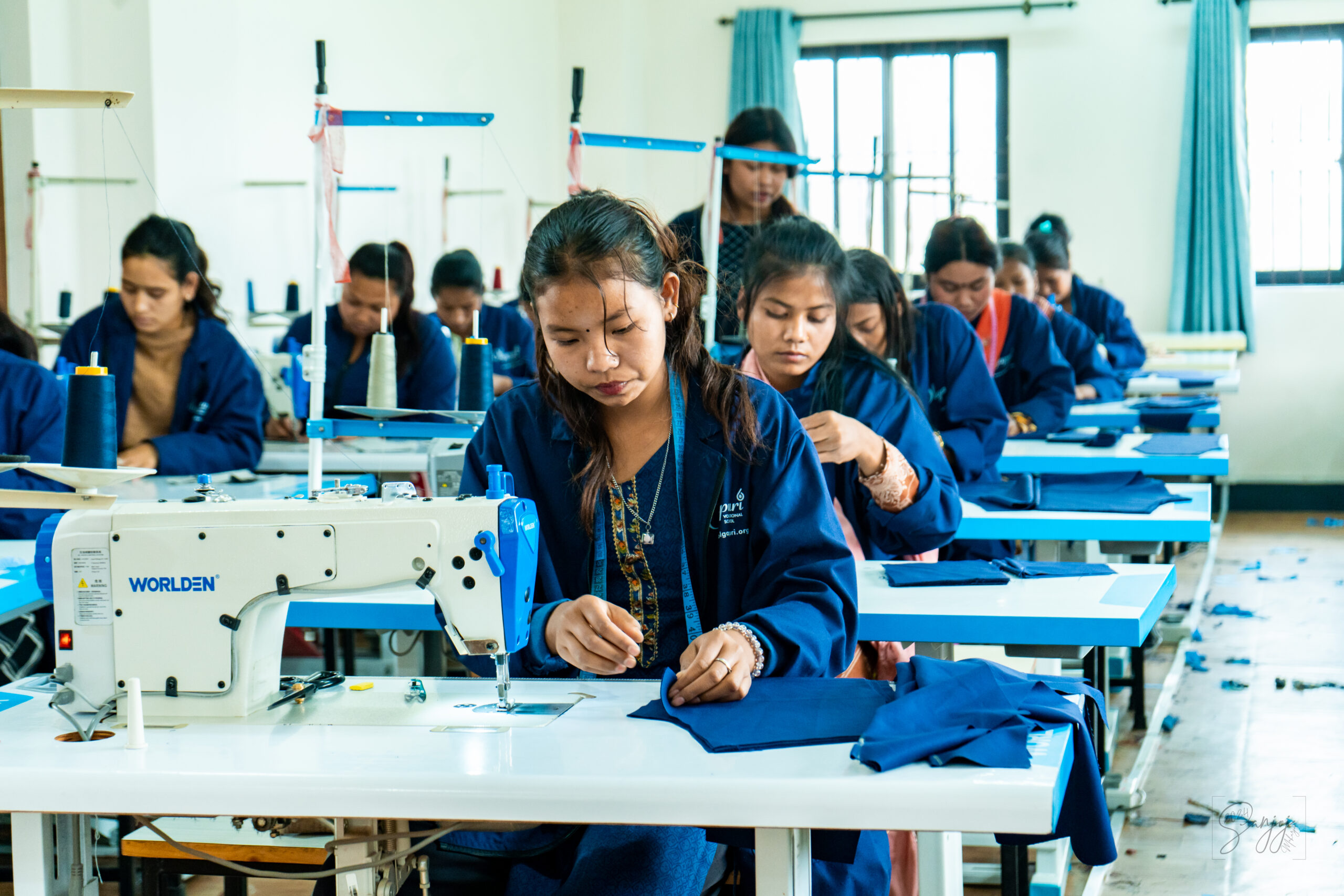
Former Kamlaris enrolled at Olgapuri Vocational School make school uniforms for massive back-to-school initiative!
Through the Caste Equality Project, NYF has spent the last few months working with local families, teachers, and stakeholders to organize a massive push towards educational equity in Saptari District.
Saptari District is a remote area of southeastern Nepal. Casteism, systemic neglect, and other generational challenges have left families unable to leverage their incredible potential to build prosperity. Boldly encouraging and championing the launch of the Caste Equality Project was among the last major projects of our late founder, Olga Murray’s lifetime, and she has trusted the NYF staff and community to share her promise and see this work through the end. Our goal is to empower Nepali Dalit communities to access the opportunities and resources they need to build towards the futures they envision for themselves and their children.
Our work in Saptari District will equip the community to be the primary agents within this important movement—exactly how Olga would have done it.
With the new school year in the district beginning at the end of April, we are stocking school kitchens with fresh, high-quality, nutrient-rich ingredients to combat widespread malnutrition and encourage school attendance. A huge part of this effort includes providing hundreds of children with school uniforms.
But these aren’t just any uniforms. They’re actually being crafted by NYF’s very own students currently enrolled in Olgapuri Vocational School’s Industrial Tailoring program. This program offers more than just hands on vocational training—but also an empowered path to a new life.
From Vision to Reality: The Industrial Tailoring Course
NYF’s Industrial Tailoring course at Olgapuri Vocational School represents a story of a worthwhile transformation from one collective vision. The idea originated from a women’s empowerment group within the Freed Kamlaris Development Forum (FKDF). FKDF is a community-based nonprofit led by and developed specifically for former kamlaris—young Tharu women who were once trapped in a system of indentured servitude in the homes of Nepal’s elite. (You can read more about NYF’s 20-year-long project freeing kamlari girls and abolishing the practice here!)
During a group discussion, these women saw the need for professional training in industrial tailoring. They recognized the potential for a stable, flexible, and lucrative career in Nepal’s booming clothing export industry. Their request was so powerful and enthusiastic that our team had to find a way to provide this opportunity. In May 2021, we welcomed our first class of students in the new Industrial Tailoring class.
Industrial Tailoring quickly became Olgapuri Vocational School’s most popular courses for women. It’s not just about learning a valuable trade; it’s about creating opportunities, building empowerment, and reclaiming futures. These special training courses support these women in their journeys to advocate for a better future for themselves, their families, and their communities.
Industrial Tailoring and the Pursuit of Caste Equality Today
In 2024, NYF’s Industrial Tailoring course continues to be a very popular option for women, including many former kamlaris.
We’re thrilled to share that the talented students currently enrolled in the course are supporting NYF’s efforts to advance educational equity in Saptari District by helping to create the much-needed school uniforms! Students are practicing their new skills by lovingly preparing structured shirts, jackets, skirts, slacks, and neckties for boys and girls in a variety of sizes—all while receiving an additional income!
Graduates of the Industrial Tailoring program have been supporting the process by fine-tuning the final products created by their peers. These graduates are earning a higher rate than they would at the factories they work for! The assignment is perfect for refining important tailoring skills that they’ll need in their new careers, while also earning a living wage through this special project. They’re creating a total of 670 sets of uniforms for the children in Saptari District to wear on the first day of school.
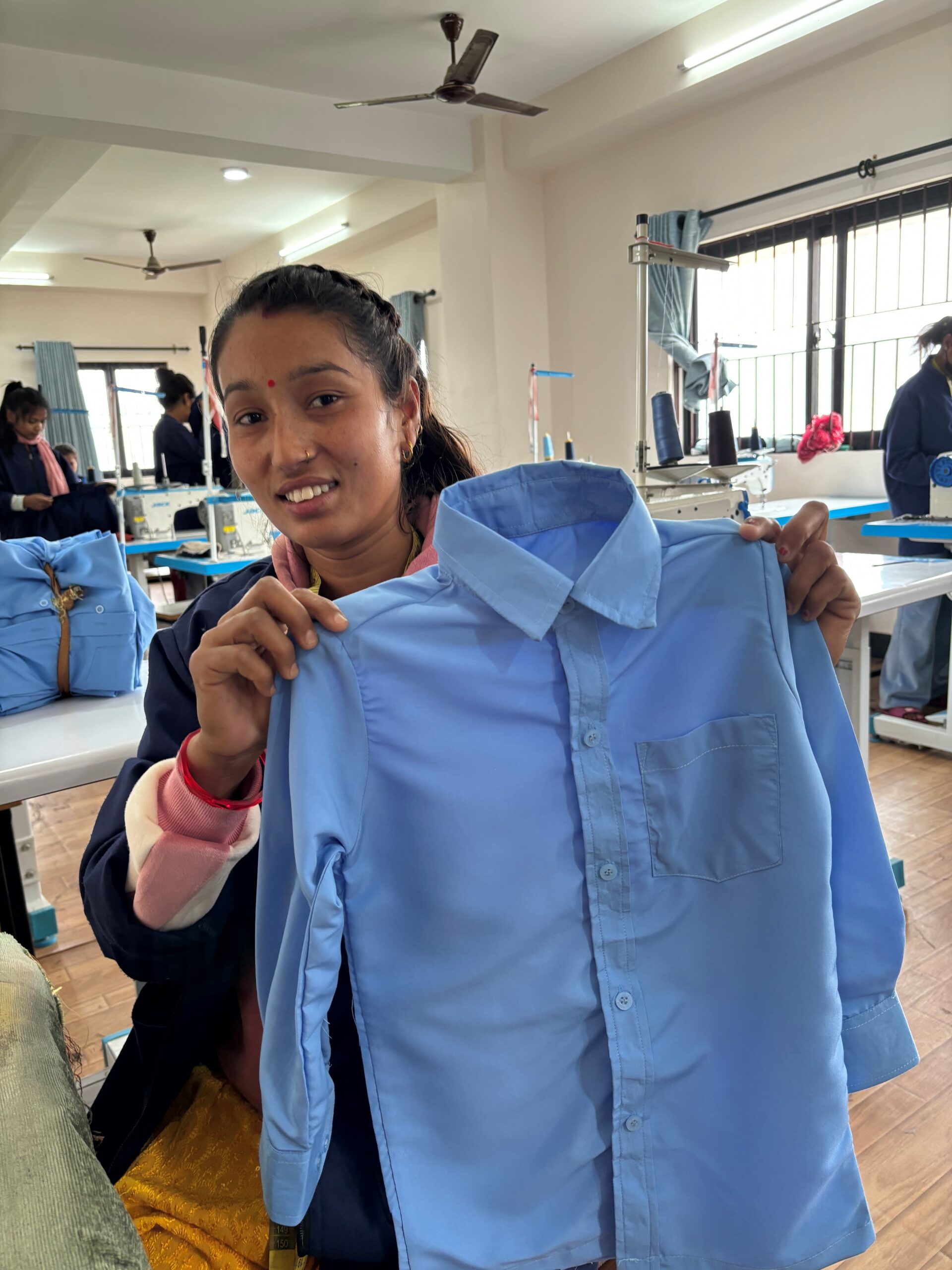
A Transformative Change in Saptari District
The timing of this educational push through the Caste Equality Project lined up perfectly with the industrial tailoring course. It has created a unique and lucrative opportunity for former kamlaris to support in creating these long-lasting school uniforms. We’re delighted that these women—who were once robbed of educational opportunities and their childhoods—are now empowered leaders who can support and transform communities in Nepal through projects like this.
As NYF continues to grow, our team molds and develops programs in the contexts of local need, potential, and participation. We strive to ensure our interventions in Nepali communities are done through sustainable measures that emphasize self-sufficiency whenever possible. What a golden example!
Join us in celebrating these resilient women who are leading the way to a better tomorrow. You too can support the Caste Equality Project and this educational push by making a donation today.
Celebrating 10 years of the end of Kamlari!
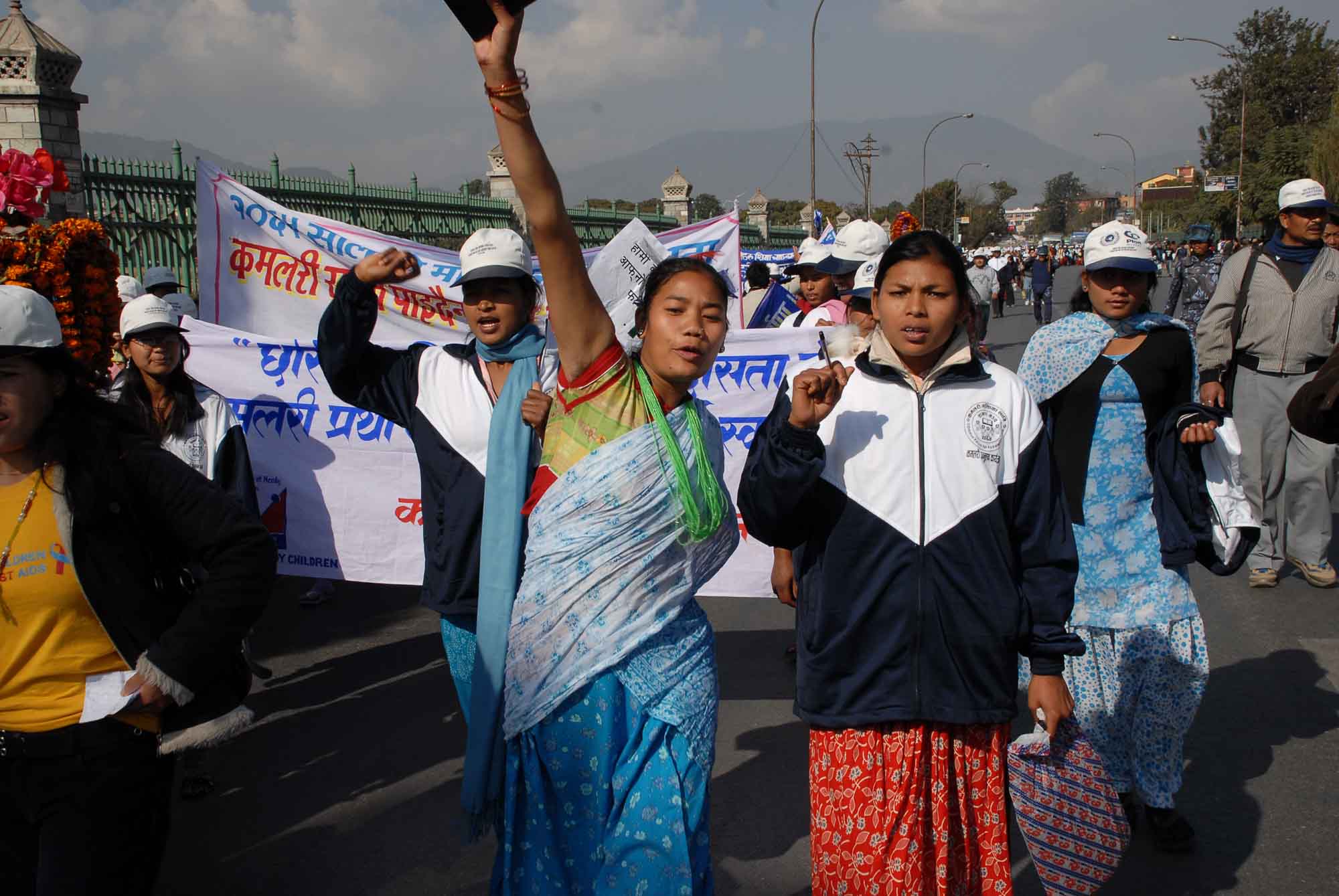
On June 27, 2013, Nepal’s legislature officially abolished the kamlari practice: a system in which members of the Tharu ethnic minority in Western Nepal sold their daughters (some as young as five years old) into indentured servitude in the homes of Nepal’s elite. The practice, built on a foundation of predatory lending, ethnic oppression, and generational debt, robbed tens of thousands of young women of educational opportunities, cultural connection, and their childhood.
NYF successfully eradicated the practice in Nepal. We empowered young Tharu women to advocate for themselves, improve the lives of their families, and support a better future for their communities.
We concluded the program in 2020, but our partnership with the Freed Kamlari Development Forum (a local nonprofit, led by former kamlaris, that NYF helped to build) continues to this day.
It’s been 10 years since the legal abolishment of Kamlari indentured servitude, so we wanted to observe the anniversary of this incredible accomplishment by taking a quick look back…
Check out recent stories highlighting freed Kamlari women:
- September 18, 2019: Freed Kamlari Development Forum (FKDF) inaugurates new headquarters!
- September 11, 2020: Tharu Leaders Transforming their Communities in Nepal
- September 15, 2020: Former Kamlari women supports communities during COVID-19
- January 14, 2021: Highlights from an external study on the impact of our 20-year efforts to empower young women impacted by the kamlari practice.
- March 5, 2021: Bishnu Chaudhary passes bar exam, becoming first Freed Kamlari lawyer
- June 24, 2021: Lila Tharu, former Kamlari, is a frontline warrior, saving lives during COVID-19
- January 19, 2023: Former Kamlaris Propose Industrial Tailoring Course
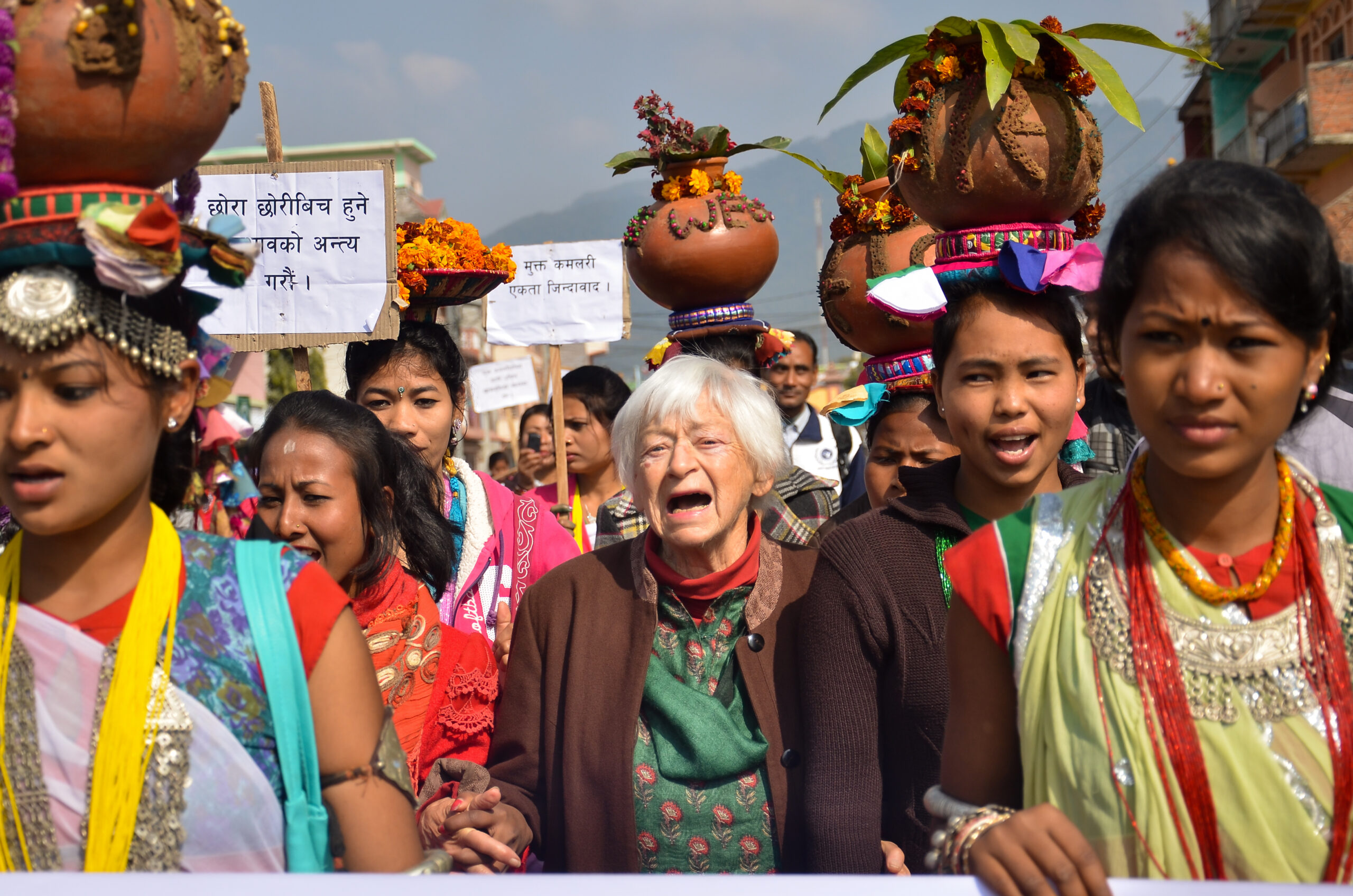
Looking Ahead
Only 23 years ago, our team was just arriving in the Western Terai to learn about the kamlari system and its place in Tharu society. The practice was so entrenched, and so accepted, within these communities that it was difficult to imagine the work it would take to eradicate the system entirely. We started by freeing a handful of girls, and charged forward from there.
Thirteen years later, in June 2013, Nepal’s government formally abolished the practice, and added annual funding to the country’s budget that would provide scholarships and support to the women and girls whose childhoods had been impacted. NYF’s tireless, creative work within the Tharu communities had rapidly taken the kamlari system from an accepted, expected, open-air practice to one seen as exploitative and unacceptable by everyone in the villages.
Now, 10 years after the kamlari practice was abolished, NYF is tackling another massive, entrenched social issue: Nepal’s caste system. Using our success in the Western Terai as a guide, our Caste Equality Project will work within Dalit (formerly known as “untouchable”) communities to empower children and families to dismantle the oppressive systems around them.
We hope you will join us.
Industrial Tailoring at Olgapuri Vocational School
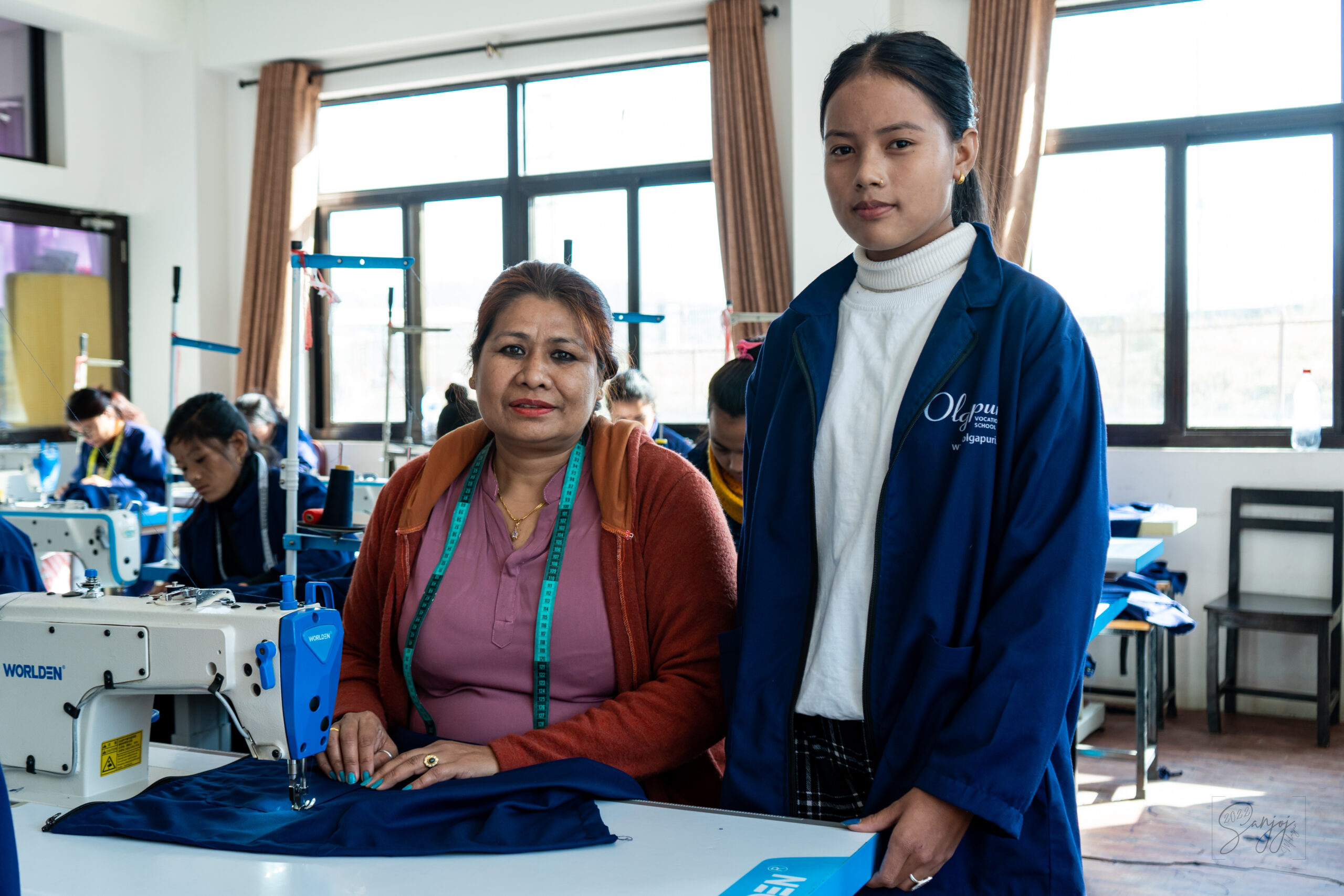
Industrial Tailoring has quickly become one of Olgapuri Vocational School’s most popular courses for women. The average monthly wage for our graduates is 30,000 rupees per month ($260), with room to grow. Those with more experience are making as much as 45,000 rupees ($390)—over three times Nepal’s minimum wage!
Over the past year, our team has had conversations with uneasy supporters about our new Industrial Tailoring vocational training course, which is held exclusively for women.
We’re hearing two main concerns:
- “Sewing is traditionally undervalued as ‘women’s work’. Shouldn’t we be trying to encourage young women to break free of these sorts of industries, rather than continuing this pattern?”
- “Isn’t the garment / textile industry particularly dangerous and exploitative? I don’t want my donations to go towards placing these bright young women into sweatshops!”
Maybe you’ve had similar concerns! In fact, people on the global team and on the board have discussed these same worries. At NYF, we deeply appreciate how thoughtful our supporters are, and how engaged you are in looking out for the children and youth we serve.
Our Commitment to Women’s Empowerment
First and foremost, our global team is committed to empowering women to follow their dreams. This is especially the case when their options are limited because of entrenched gender roles and hierarchies. We believe every girl and every woman should be free and safe to choose her own destiny!
We’re also appalled by the conditions within many of the world’s factories—not just garment factories. No one on our team wants to see any one of our beneficiaries trapped in an oppressive, unsafe working environment.
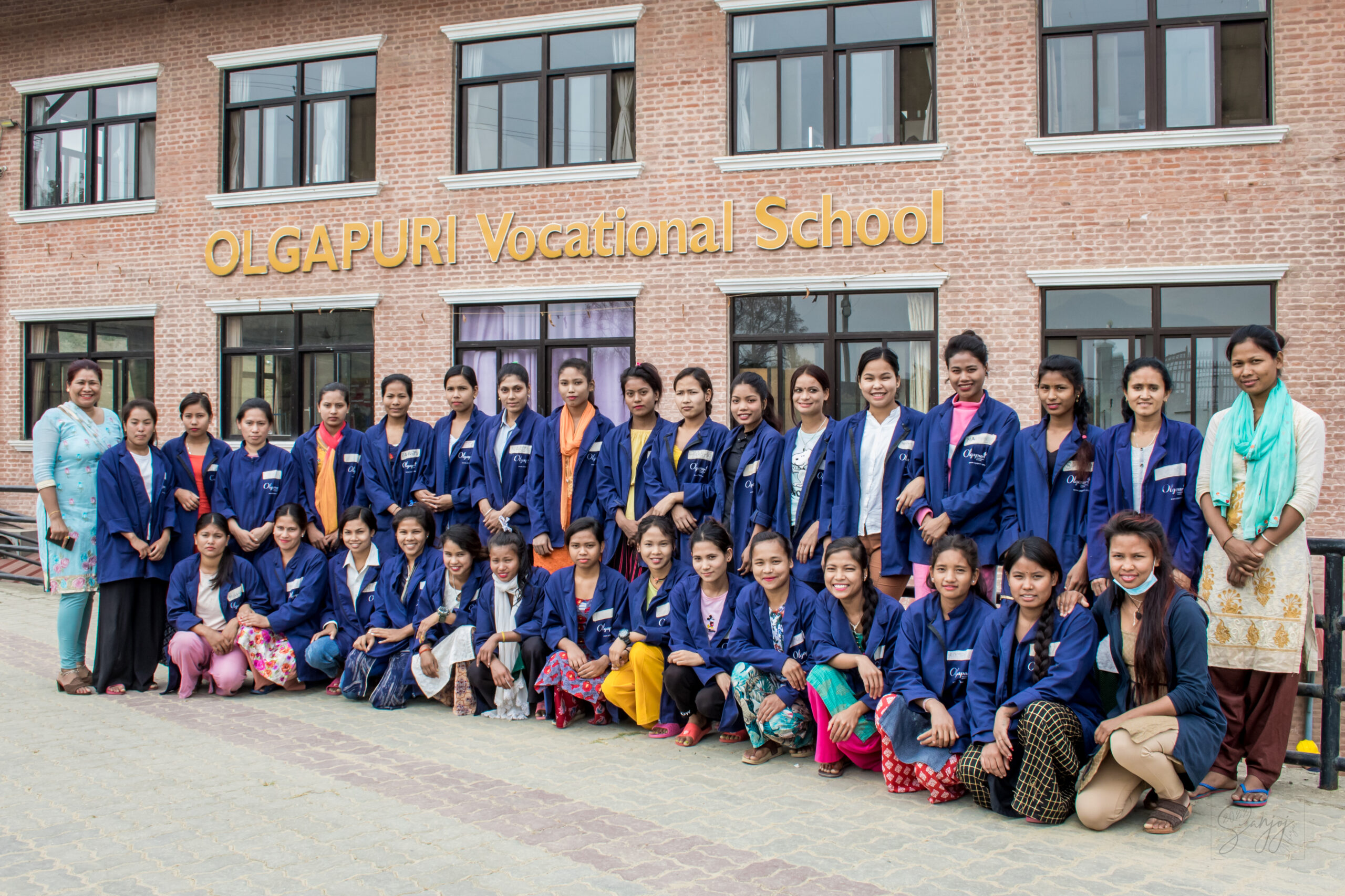
All Olgapuri Vocational School courses are openly advertised as available for all genders. At the orientation presentations where young people are given application options, women are always strongly encouraged to apply. Some of the instructors for these courses are women, giving potential students clear evidence that women are welcome.
However, despite all this, NYF has struggled to interest young women in signing up for these opportunities. As a result, enrollment in these programs is overwhelmingly male (a staggering 90%).
Our team has been working for several years to understand this phenomenon and to provide good solutions. Young women know they are welcome to apply for these courses in male-dominated career fields.
But many of these young women still don’t feel safe in those industries.
NYF can place female construction graduates in positions where we know they will be hired, paid equitably, and respected by their employers. Unfortunately, we can’t guarantee that they will not experience sexual harassment and other sexist aggression in the workplace.
Many young women don’t want to walk that challenging path, even if it pays more. They just want to make a decent living, gaining personal economic freedom without entering a career where conditions simply won’t feel safe for them as women. We can’t fault them for that.
Former Kamlaris Propose Industrial Tailoring Course
Olgapuri Vocational School’s Industrial Tailoring course was proposed by a group of former kamlaris. This initial group of young women met one another in a women’s empowerment group run by the Former Kamlaris Development Forum (FKDF). (The FKDF is a community-based nonprofit NYF helped found in the Tharu communities impacted by the traditional kamlari practice.)
In a group discussion, several of these women shared that they wished NYF offered a course in Industrial Tailoring. It seemed strange to them that this course wasn’t available. After all, they reasoned: clothing is one of Nepal’s biggest exports, and the job market in this area is growing. Careers in this field are stable, well-paying, and have room for growth and flexibility.
Even knowing that women were encouraged to apply for the construction training programs, some of these women almost felt left out by OVS because we weren’t offering trainings in the career fields most likely to attract female engagement.
The freedom to choose among a set of only male-dominated options just didn’t feel like real freedom.
Fortunately, these empowered young women knew they could ask NYF directly about such an option. They also had a growing group of women behind them who all agreed they’d leap at the chance to earn their certifications in Industrial Tailoring.
When this group approached NYF, our team let them know the common concerns about workplace dangers in the garment industry. The young women responded that construction trades are also dangerous. They all knew someone who had experienced an electrical accident or been injured by a power tool. And as far as exploitation was concerned, these young women had already survived kamlari bondage. They know better than most that bad actors exist in all industries.
Thanks to NYF and the FKDF, though, they also possess the extraordinary inner tools that empower them to defend themselves from exploitation—and motivate them to defend their sisters as well.
Their request was so powerful and enthusiastic that our team had to find a way to provide this opportunity.
The Curriculum
NYF’s team made connections with local high-quality garment factories known for their fair practices and safe working conditions. They asked for their guidance in creating an ideal classroom and for help developing a specialized curriculum. These experts shared a list of skills all their employees needed to master, as well as a list of “dream skills” that made tailors especially competitive in the workforce.
Being highly skilled in a trade is a major safeguard against exploitation in any industry. This is because it allows workers the flexibility to seek out better workplaces without risking financial ruin.
Our team designed a six-month course which would prepare trainees to create high-quality garments for local consumption as well as for international export. Importantly, the training also includes the information needed for a student to establish her own small clothing business.
The curriculum covers industrial machine operation and maintenance, different kinds of stitches and their uses, measurement skills, fabric types and their uses, clothing design principles, and how to take items from printed designs to fabric cutting to assembly and through to the finishing touches. Safety is always an important topic as well.
Trainees are given specialized life skills and group therapy sessions (and, where needed, personal therapy as well) through NYF’s Ankur Counseling Center.
They also participate in motivational sessions on women’s empowerment!
During the entire six-month course, trainees live in the Olgapuri Girls’ Hostel. This is a space created especially for young women in vocational training courses (many of whom are not familiar with city life) so they can feel safe and secure during their training.
The first four months of the training consist of classroom instruction, followed by two months of paid On-the-Job training in one of the city’s high-quality factories. This is a paid apprenticeship period, with pay being nearly double Nepal’s minimum wage.
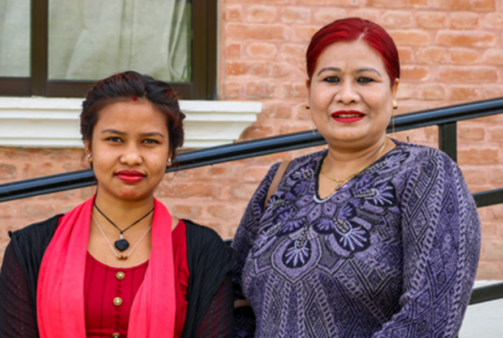
Meena Kumari Chaudhary (left, Asst. Trainer) is a former kamlari—and she was also one of the earliest graduates of our Industrial Training program! She’s thrilled to be using the skills she learned here to empower more women to enter this growth industry.
Here, she is pictured with Lead Trainer Anju Thapa. Both women have become role models for the young women hoping to build a sustainable career in tailoring!
Workplace Safety
Unfortunately, sweatshops do exist in Nepal. These cramped factories regularly ignore laws and regulations, have extremely poor and unsafe working conditions, and have unscrupulous bosses who demand inhumane working hours and withhold pay. NYF would never partner with these organizations, let alone intentionally place a trainee in such a working environment.
Kathmandu is also home to factories where workers are treated fairly, paid well, and conduct their work in well-lit, airy spaces that are kept tidy, with wide paths for evacuating in an emergency, ensuring safety for everyone. These are the workplaces our graduates enter, as a group of empowered women determined to build their futures—and continue working towards a more equitable world.
Bindu’s Story
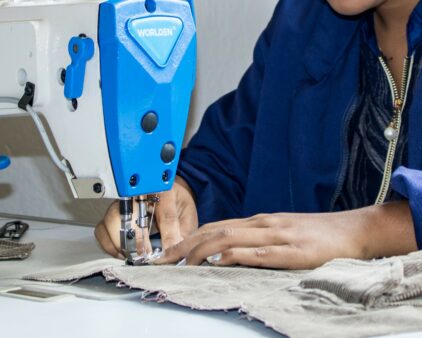
Bindu* has survived horrific ordeals over the past two years. During the COVID pandemic, she started dating an older man, against her parents’ wishes. Soon, this man convinced her to run away with him to start a new life in India. Dreaming of a beautiful future, Bindu followed him across the border. Bindu quickly learned that the man’s intention all along had been to traffic her.
Betrayed and heartbroken, Bindu relied on her inner strength to survive her situation—and she somehow managed to escape her captor and return to Nepal.
But the nightmare wasn’t over. When Bindu finally reached her home village, her parents rejected and disowned her.
Fortunately, Bindu found an organization working with women who have survived sex trafficking, and they helped her file a case against the man who trafficked her. Thanks to Bindu’s courage, he’s now in prison, where he can’t hurt any more girls and women.
Bindu found housing in a women’s shelter in Kathmandu as she prepared for her next steps. One of the staff members there heard about NYF’s new Industrial Tailoring program—and immediately thought of Bindu.
Bindu has taken to the Industrial Tailoring skillset extraordinarily well. For the first time since she ran away from home with a heart full of hope, Bindu feels like her dreams are truly within reach.
“I never thought I’d be able to acquire a skill that would pay me this much,” she says, adding, “Economic independence is very important to me, as I have no family to support me. The work environment is also safe and pleasant. The other girls and women that I work with have become like my family—and my greatest support system. I feel very fortunate to have had the opportunity to meet them and work with them.”
A long waiting list…
In the first year of its existence, the Industrial Tailoring course quickly became one of OVS’s most sought-after options. Our team has already trained 149 women—and there’s a long waiting list. Most of these women are former kamlaris from western Nepal, but we’ve also received numerous referrals from Kathmandu women’s shelters and other aid organizations. This training has already empowered single mothers, survivors of domestic violence and sexual abuse, and women who have escaped trafficking.
We are so grateful for the support that allows us to offer these women this remarkable opportunity. We hope to be able to continue offering it as long as young women are interested.
The Empowering Freed Kamlaris program is one of NYF’s greatest achievements. For more information on the former kamlaris and the FKDF, please visit https://nyf.news/efk
Updates from NYF President Som Paneru
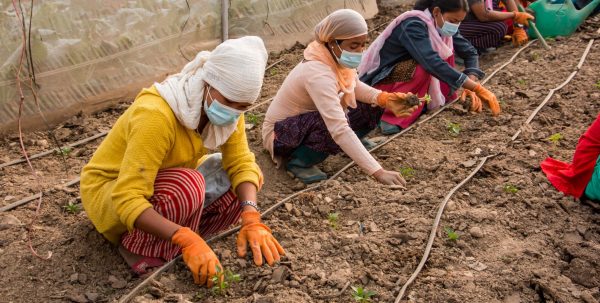
Dear NYF Community,
I hope you are all continuing to stay safe and healthy. Earlier this month, the Nepal government made an announcement to ease COVID-19 restrictions. Among other things, this included the physical re-opening of schools and public spaces. This decision has several impacts on our programs at NYF, and I am delighted to share these new updates with all of you.
COVID-19 Updates & Response Programs
NYF’s COVID Isolation Center at our flagship Nutrition Rehabilitation Home (NRH) ran until September 16, 2021. Since its opening, we’ve admitted and treated more than 240 COVID-positive patients at our facilities. Following this recent government decision to re-open public spaces, NYF suspended isolation center services on September 17th to fully resume our regular NRH programming. We are continuing to produce Lito, our homemade “super” flour, at the NRH and are still distributing them to communities in need via the Lito for Life program. For more updates and information about our COVID-19 response, visit NYF’s COVID Timeline.
Education
Until now, schools and colleges nationwide have been closed. Out of the 643 scholarship students NYF currently supports, 70% have been attending online classes run by their schools and colleges. After this most recent decision, most NYF children will likely be able to return to in-person classes later this fall. Additionally, after a massive COVID-related delay, the long-awaited examinations for grade 12 students finally took place on September 15, 2021. About 40 NYF students took the exam.
Vocational Education & Career Counseling
As you may recall, most of our vocational training programs were put on hold earlier this year. We are happy to announce that NYF has safely resumed some training programs in the electrical, welding, carpentry and plumbing trades. Effective last week, we have 4 vocational training satellite courses currently running. NYF is also preparing to complete 2 more Sustainable Agriculture and Entrepreneurship Trainings (SAAET) by the end of the year.
Nutrition Rehabilitation Homes (NRH) & Nutrition Camps
There are currently 8 children being treated at the NRH for malnourishment. We are expecting an increase in the number of admissions as we resume our regular services and programming. Our NYF nutrition staff is also busy strategizing how to safely conduct our regular nutrition camps this year.
New Life Center (NLC)
Due to travel restrictions brought about by COVID-19, patients had a difficult time traveling to the New Life Center in Kathmandu Valley to receive treatment. In order to increase access to supportive care for children living with HIV/AIDS in rural communities, NYF has redesigned the NLC program.
The aim of this redesign is to bring New Life Center resources to a larger population of children. To do so, we’ve moved beyond the “residential-treatment only” approach to an expanded “outreach and community-based” approach. According to the new plan, the NLC will cater residential services to approximately 20 children, while all the other services will be completed in rural communities via community outreach. These community outreach programs include awareness and advocacy, food and essentials delivery, financial support for caretakers, and tele-counseling services.
While this program will still be run from the NLC office in Kathmandu, we are excited to partner with a number of grassroots organizations — all doing incredible work in the communities we plan to serve.
Olgapuri Children’s Village
First and foremost, all 71 children (and house parents!) at Olgapuri remain safe and healthy. This year, nine students will soon be moving out after graduating high school. We are so proud of each graduate, and look forward to seeing them go on to do incredible things!
Thank you for your support.
Friends, we are deeply grateful for your continued love and support for the children, young adults, and families in our care. Thank you, also, to our staff on the ground in Nepal and for their incredible work. As always, if you have any questions about these updates or would like more information about our programs in general, please don’t hesitate to contact us at info@nepalyouthfoundation.org.
With gratitude,

Som Paneru
NYF President
International Youth Day 2021: SAAET Stories from Early Project Graduates!
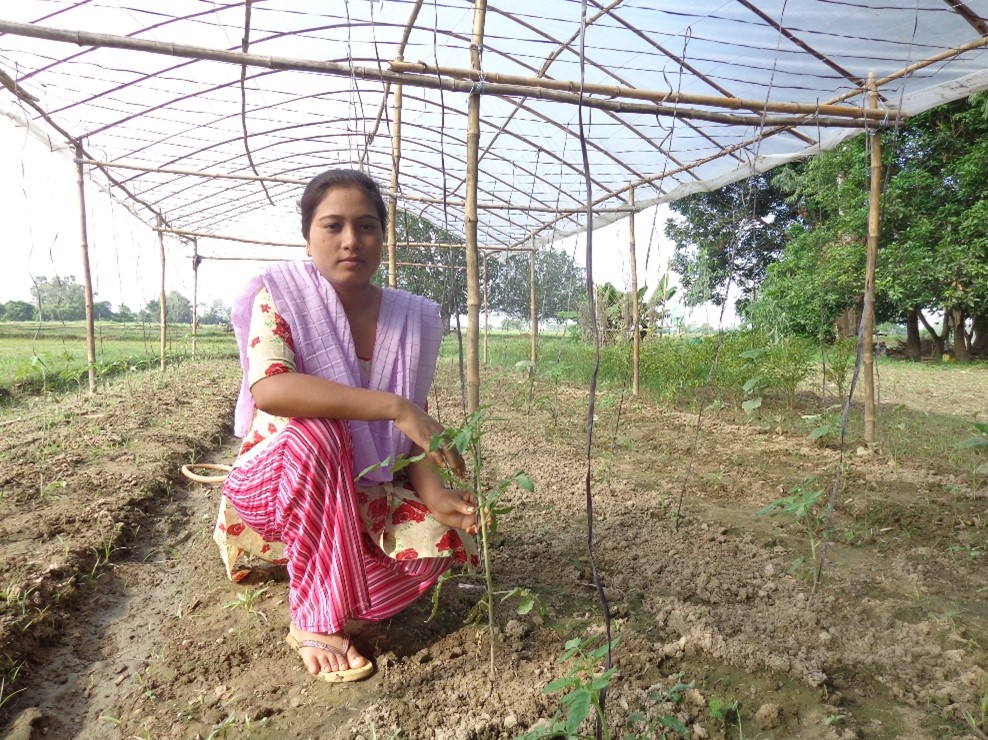
International Youth Day
International Youth Day occurs every year on August 12th. It’s a valuable chance created by the UN to focus on the biggest issues facing young people throughout the world. The theme in 2021 is “Transforming Food Systems: Youth Innovation for Human and Planetary Health.” As the world population grows and nations respond to climate change, sustainable food systems will become more important than ever. To achieve the necessary changes, the participation of young people is critical!
This International Youth Day is a great opportunity to share some of the earliest success stories from NYF’s new SAAET Project!
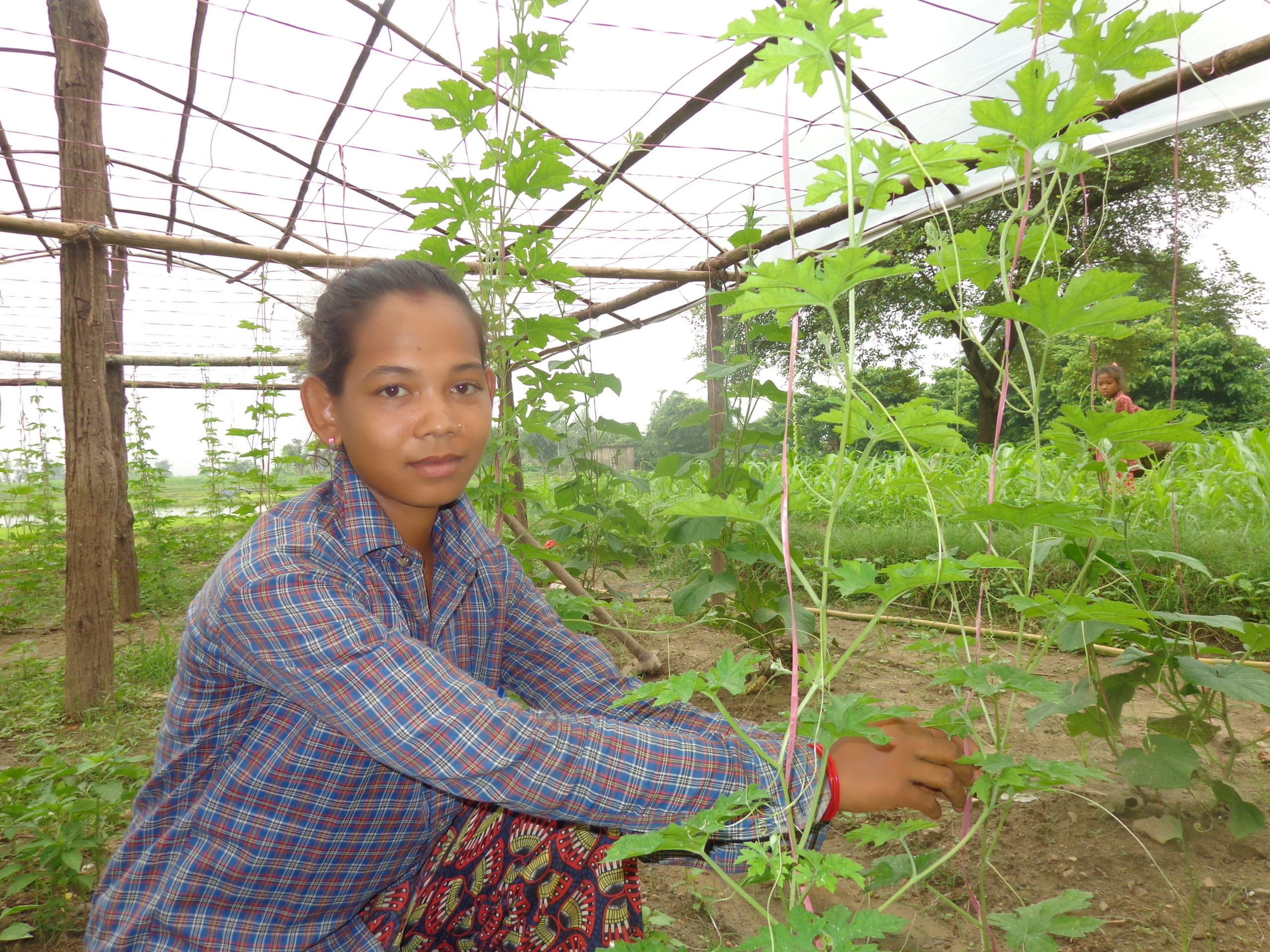
The SAAET Project
Saaet is Nepali for “an auspicious moment of starting a new journey” – and at NYF, it stands for Sustainable Agricultural and Entrepreneur Training.
This project tackles gender inequality, skills development, and food systems all at once. Designed especially with young women in mind, this course brings simplified greenhouse technology and up-to-date organic agricultural practices to individuals hoping to achieve financial success while staying within their home communities.
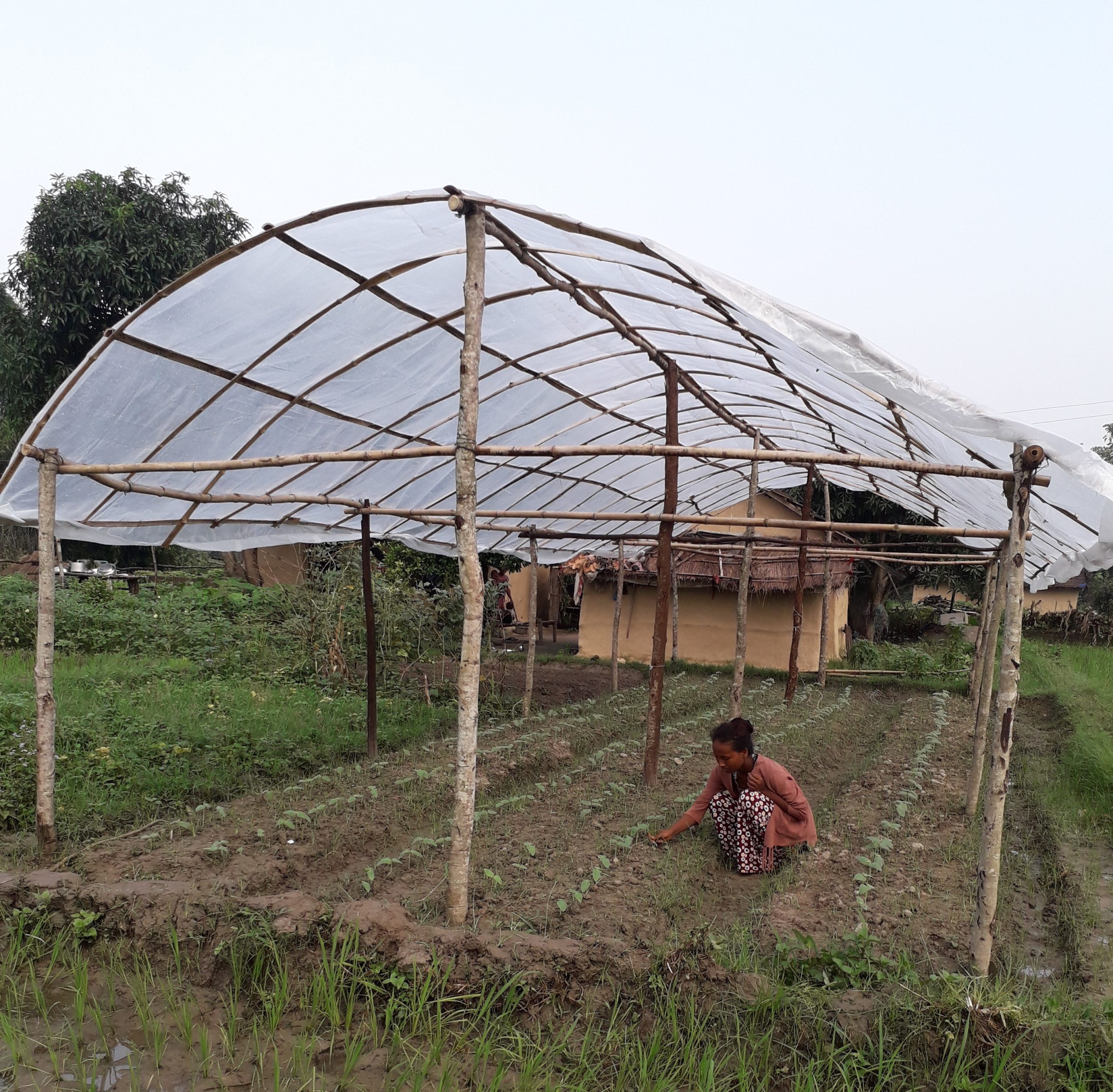
NYF’s Vocational Education and Career Counseling Program (VECC) offers multiple job readiness and vocational education options to Nepalese young people seeking career opportunities close to home. Those we help are experiencing many different kinds of barriers to economic success—but those most in need are usually young women.
The SAAET Project is just one part of NYF’s work to combat child marriage in Nepal, and part of our commitment to helping young women and girls find economic empowerment on their own terms.
Our first class of SAAET students were Freed Kamlaris from the Western Terai. Their training took place in March-April 2021—let’s see how they’re doing!
Sunita T.
When Sunita was only 13 years old, her father sent her to work as a kamlari far away from her home in Bardiya District. In exchange for her labor, the family was promised two things: they would be allowed a large enough plot of leased land to feed the family year-round, and Sunita would be sent to school.
As so often happened, the family broke their promise about Sunita’s education. She worked as a kamlari for 5 years, until she was 18 years old. NYF knew about her situation from surveys conducted in the village, and we had to threaten legal action to finally bring her home.
Sunita is 26 years old now, and the memories of her days as a kamlari are still fresh and painful.
She worked extremely long hours, from early in the morning to very late at night, locked in the house doing cooking, cleaning, childcare, and any other work that came up. Sunita hopes no child ever has to suffer that way again.
Once rescued, Sunita enrolled in grade 6 and managed to complete her studies through grade 10. In Nepal, all students must take the notorious “Iron Gate” exam (the Secondary Education Examination) at the end of grade 10. This extremely rigorous test determines who can move forward. Sunita was unable to pass the Iron Gate, so her academic studies ended there.
She got married in her early 20s and, through NYF support, took an 18-month vocational course in agriculture. Sunita and her husband decided they preferred the idea of farming over the notion of working for someone else, so they applied for a microloan from their local co-operative and started banana farming. Soon they added vegetables, chickens, and pigs. Sunita and her husband have been happy to be able to pay back the co-operative loan, and they’re paying the lease on their land through their own earnings now.
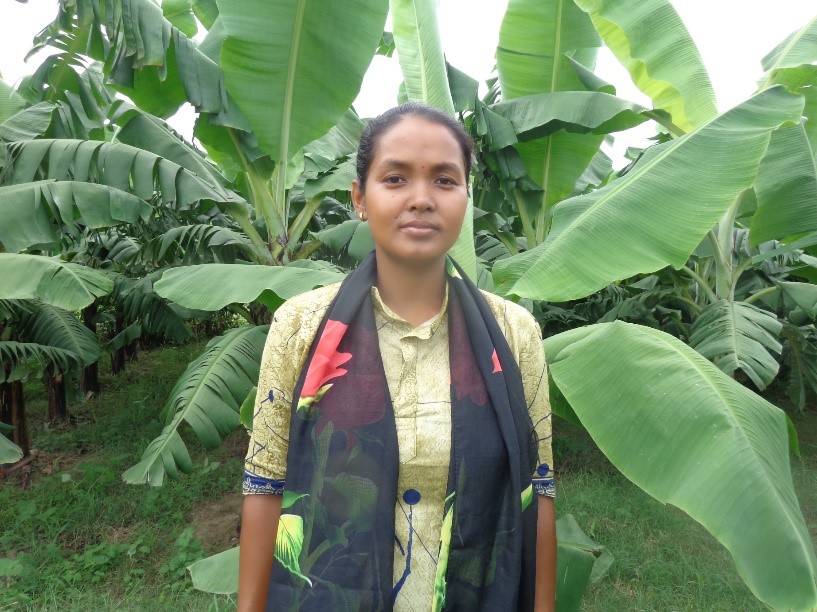
But Sunita hopes to be able to own the land outright and expand the business further.
That’s why she was so happy to join the first class of the SAAET Project. The material taught in the class expanded Sunita’s existing knowledge of best agricultural practices and gave her great new ideas for her farm. She also learned helpful business practices!
When she returned home, the spring COVID outbreak was just hitting the Western Terai, and shutdowns made accessing building materials more difficult than expected. But Sunita was still able to start working on her own new greenhouse, which will allow her even more crop flexibility. She is already harvesting her first greenhouse crops, and she’s looking forward to being able to continue growing vegetables through the winter months. Sunita and her husband are hoping their farm will become a model for other farmers in the region.
“Dhanyabad, NYF!” she says. “I am very grateful for the invaluable support I have received from NYF which has transformed my life beyond my imagination.”
Lila C.
When Lila was born, her entire family was bonded in a practice called Kamaiya. Nepal abolished the Kamaiya system in 2000, freeing the family from this exploitative practice. But without much government support for families like Lila’s, they soon needed access to farmland they could only get by making Lila a kamlari for their landlord. (Kamlari was the last remaining piece of the old Kamaiya system.)
“My landlords did not send me to school, but I missed going to school badly. I was studying in grade 4 when I had to become a kamlari,” Lila says. “I had to sacrifice my education just for my family to be able to get two decent meals a day. There was no way the landlord would give us the land for farming if I refused to work.” Lila was ten years old and carrying the threat of her whole family’s starvation on her shoulders.
As a kamlari, “I had to do all the work from cooking, cleaning and looking after the landlord’s children, to cutting and collecting fodder for the cattle,” she recalls. “If I was ever late to come home or late for work, I would be scolded badly.”
One year into her time in bondage, Lila learned about an anti-kamlari campaign in her village. “I feel so lucky that I did not have to work as a kamlari as long as so many of my friends did,” Lila says. NYF had been collecting the names of known kamlari girls, and Lila’s name had appeared on these lists. “I was worried I wouldn’t be able to go to school after returning home, but on the day of my rescue, I heard that the same organization would be sending me to school, too. I felt so happy. And I suddenly felt so relieved and light at heart because I would not have to bear the anger and scolding from the landlords anymore.”
Lila studied all the way through 12th grade and then completed an 18-month agricultural science course on an NYF scholarship.
She and several other freed girls established their local co-operative to help their community grow its economic power, and Lila helped her family start up a vegetable farm that could feed them year-round and even bring in up to $60 a month.
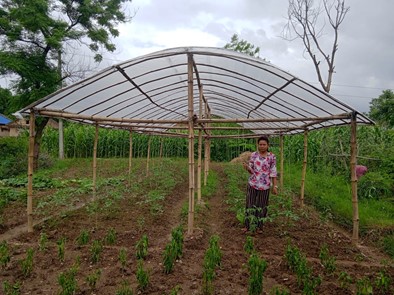
Lila got her greenhouse started right away when she returned home from the SAAET training. Her family is already seeing the benefits of the program on their diet and on their ability to bring in extra cash! She is looking forward to adding in the drip irrigation system soon, and is planning her strategies for fall and winter crops.
Now, at age 26, Lila knew she needed a bit more specialized knowledge to take the family farm from subsistence agriculture to a fully-fledged business. She was thrilled to hear about the SAAET Project.
“During the training I learnt about increasing production by growing vegetables throughout the year using more efficient tools and techniques,” she explains. “I also learnt about organic farming and producing organic pesticides by myself. NYF not only provided the skills but also a start-up fund for us to build a greenhouse. With the money and the skills, I and my family have built a greenhouse near our house and have already started vegetable farming. I am confident that we can produce far more than before and increase our income. Gradually we plan to expand greenhouse farming and establish a successful business.”
Arati T.
Arati was ten years old when her father sold her off as a kamlari in a different village. “Even now, I always get sad and wonder what made my father to sell me as a kamlari,” Arati says. “I try and console myself that it was not entirely his fault alone, and that he was a victim of the oppression and the ill practice of slavery of the Tharu people.”
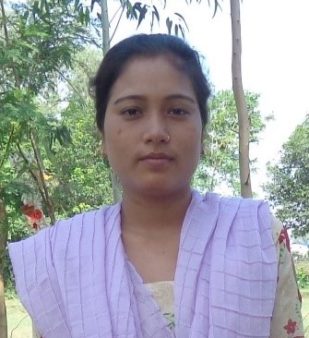
Memories of her kamlari years are painful and difficult for Arati.
“My parents had sent me as a kamlari on the condition that I should be sent to school. The landlords therefore admitted me in school, but I was able to go to school only after finishing all the work at home. I had to wake up in the dark hours before four o’clock in the morning and start my chores. I looked after the landlord’s children, cooked, cleaned, did the dishes, and all the other chores around the home. The landlords would get very angry if I made any mistake and scolded me constantly.” Arati takes some faint consolation in the fact that her landlords did not beat her.
“I was desperately looking for a release from this condition,” Arati recalls. “I wanted to be free like other children and go to school like them.”
After three years, a massive anti-kamlari campaign took hold in Arati’s village and NYF rescued her from bondage by NYF. “I felt very lucky that I got this life changing opportunity,” she says, “and I pursued my studies seriously.”
Arati recently completed the 12th grade. During her studies, she was part of a group of freed girls who established a local co-operative for savings and credit. She’s a proud contributing member of this co-op.
Back in 2018, Arati and her family acquired a plot of land to start a vegetable farm—but they have not managed to run it in a systematic, commercial manner. Arati signed up right away when she heard about the SAAET Project, knowing the training would make a huge difference.

“During the training we (21 girls including me) learnt a lot about using more advanced tools and technology for greenhouse farming, and about adopting agriculture as an income-generating enterprise.
After I returned home from training, I have built a greenhouse and started vegetable farming with the help of my family. I now have the knowledge about both seasonal and off-season farming, which will enable us to produce vegetables throughout the year. I am confident that by using the knowledge and skill I acquired from the training, we can easily increase the production and income by as much as three times than what we are able to do now. My parents are also very happy and proud of me and the work we are doing as a family.”
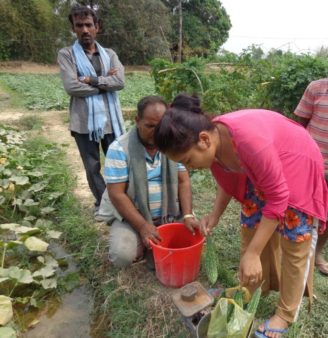
Those in Arati’s village are already spreading the word that she has vegetables to sell! Her farm, and others like it, will make an enormous difference in the health of the surrounding communities.
Only the Beginning
The SAAET Project has developed organically as NYF has responded to the pandemic—and we are enthusiastic about developing it further. This International Youth Day, we are so proud to be helping communities of young people pull their communities forward using new innovations and skills.
As Nepal’s economy heals from the COVID-19 pandemic’s impacts, young people in Nepal will need job preparedness training and career education more than ever.
To help us continue offering the SAAET Project and other vocational training programs, please donate today, and share our message on social media!
(For an even greater future impact, consider celebrating National Make a Will Month throughout August 2021 by joining our Legacy Circle!)
World Youth Skills Day: Celebrating NYF Breakthroughs During COVID
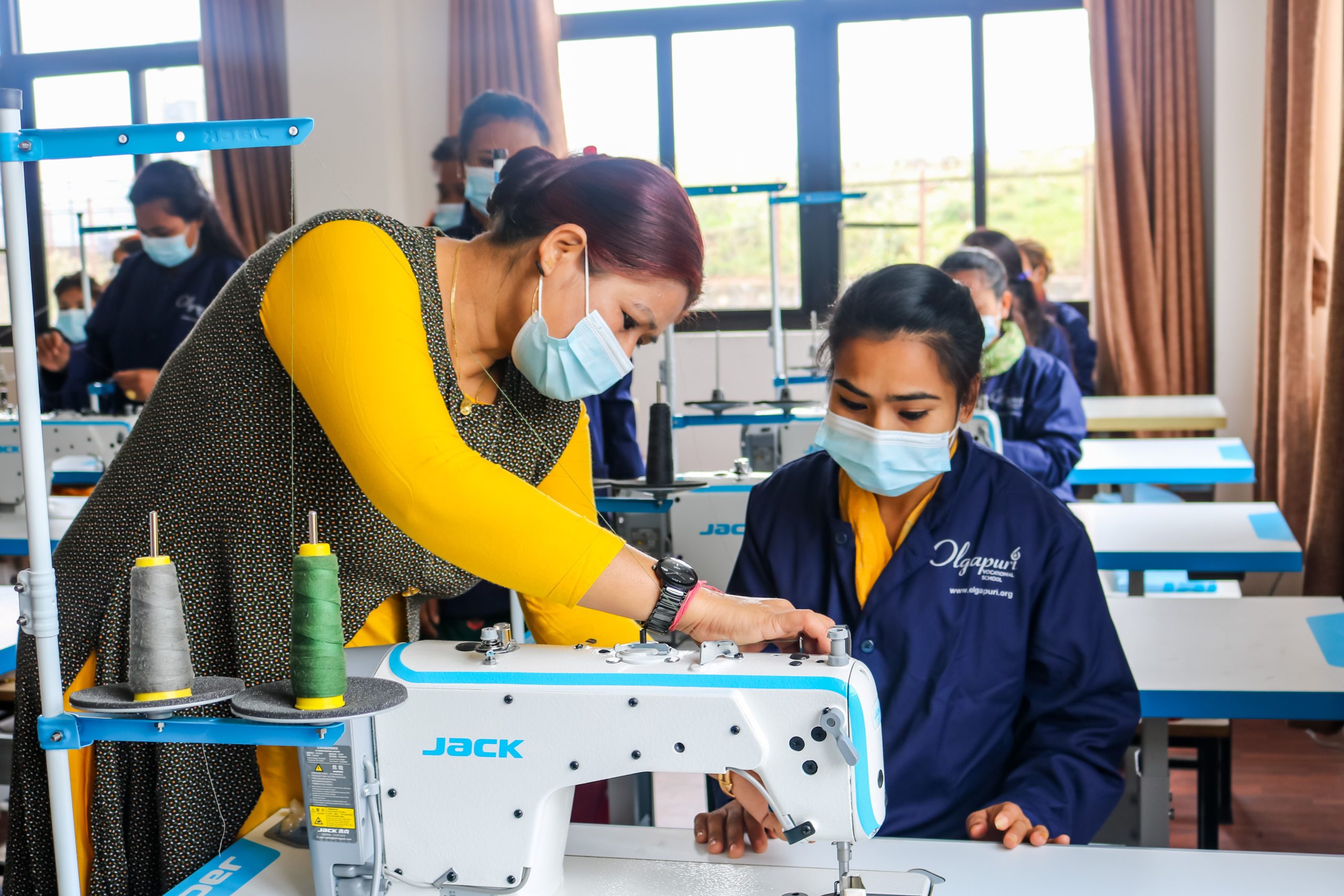
The United Nations General Assembly declared World Youth Skills Day in 2014. Each July 15th since then marks an opportunity to “celebrate the strategic importance of equipping young people with skills for employment, decent work and entrepreneurship.”
COVID-19 has hit the world economy hard. But many are surprised to learn that globally, young people aged 15-24 have been impacted more severely than any other group when it comes to employment. World employment for all adults fell 3.7 percent in 2020. For young adults, the rate was 8.7 percent.
Young women have been hit even harder than young men.
Empowering young adults with strong paths to employment will be critical to the global recovery from the COVID-19 pandemic. This is especially true in Nepal, where extremely low pre-pandemic employment levels were already hindering economic growth and opportunity for young people.
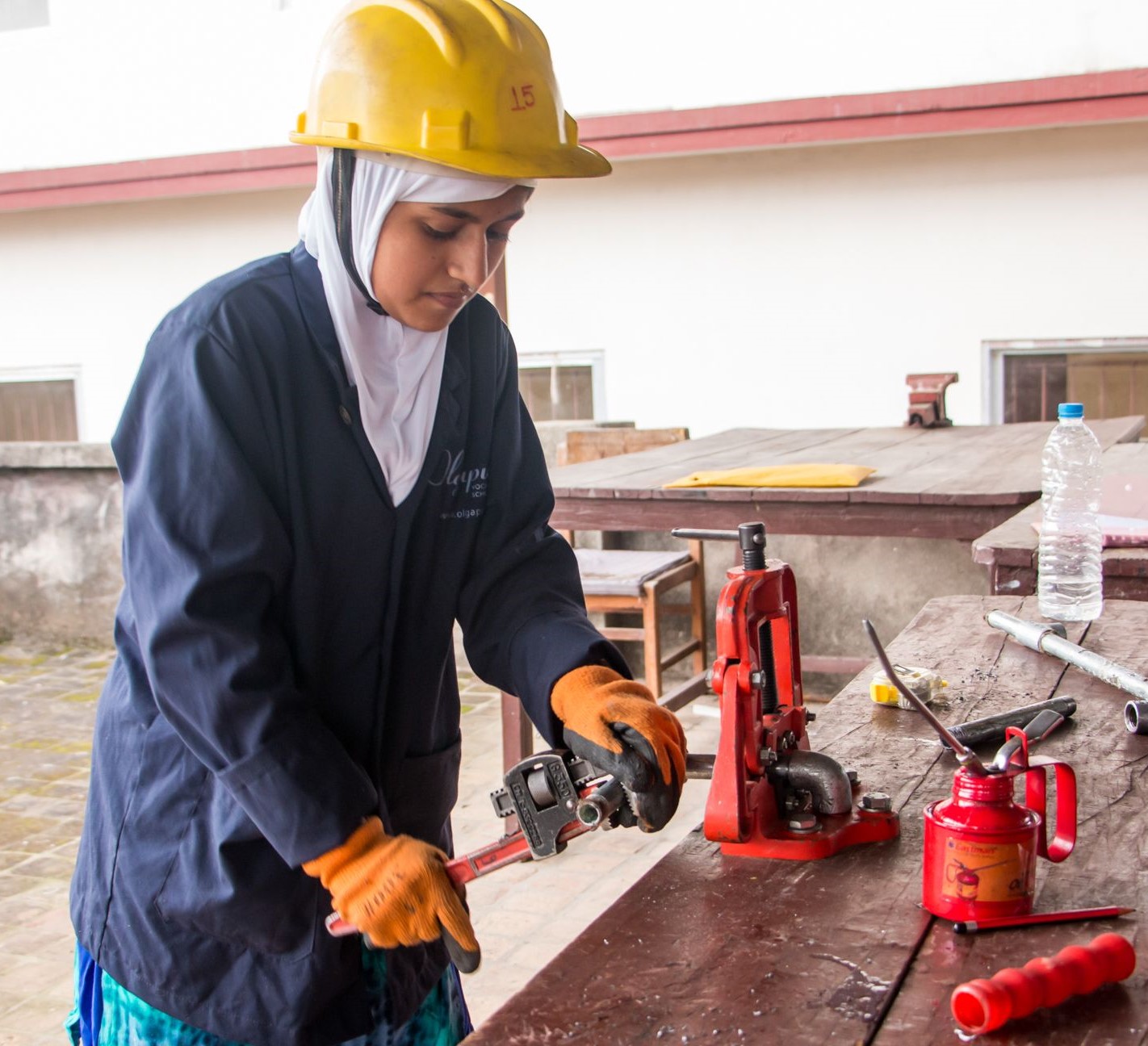
The UN is urging countries to invest more in job-readiness education for young people. This applies not only to traditional academic education, but to vocational education, skills training, career counseling, and other paths towards independence and economic empowerment.
This World Youth Skills Day, NYF is highlighting our work in Vocational Education and Career Counseling—including high-impact programs like Olgapuri Vocational School, Vocational Diploma Scholarships, and our new SAAET (Sustainable Agricultural and Entrepreneur Training) program!
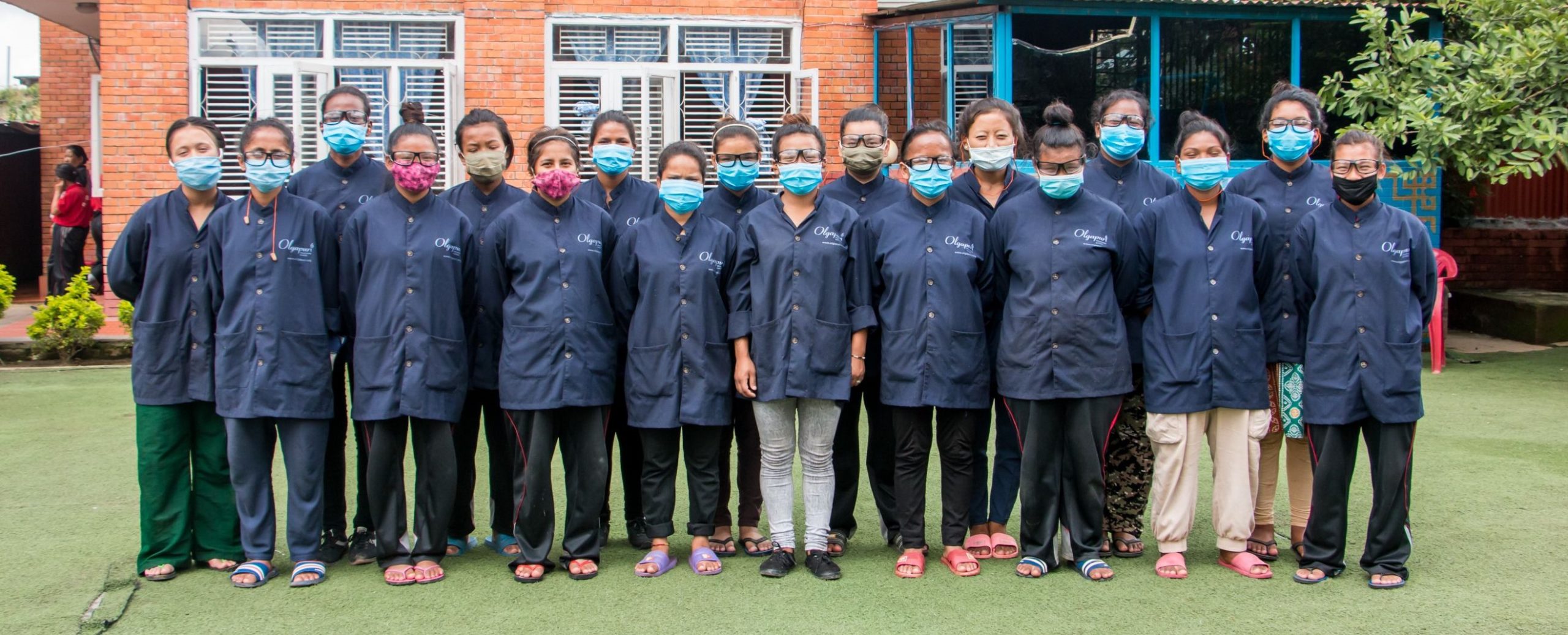
Vocational Education and Career Counseling
Many young people in Nepal are unable to complete their grade school education. Whether due to personal aptitude, economic barriers, inaccessibility, trauma, or other factors, the academic path towards success is sometimes not possible.
The demand in Nepal is high for skilled work. Especially since the 2015 earthquake, many career opportunities exist for welders, electricians, carpenters, woodworkers, and plumbers. During normal years, tourism is also an industry offering strong careers in restaurants and hotels. These careers pay much more than the backbreaking daily labor many Nepalese young people find themselves taking—the labor many of them watched their parents perform for decades while never being able to build wealth and prosperity.
However, though the demand is high for these skills, Nepalese companies often struggle to find qualified, trained local young people. As a result, workers from India and other countries fill so many of these high-paying positions.
Meanwhile, young Nepalese men and women can often only find job prospects beyond their country’s borders and far from family, where language barriers and other factors make them vulnerable to exploitation. These overseas positions separate families for months on end and provide workers with barely enough money to get by.
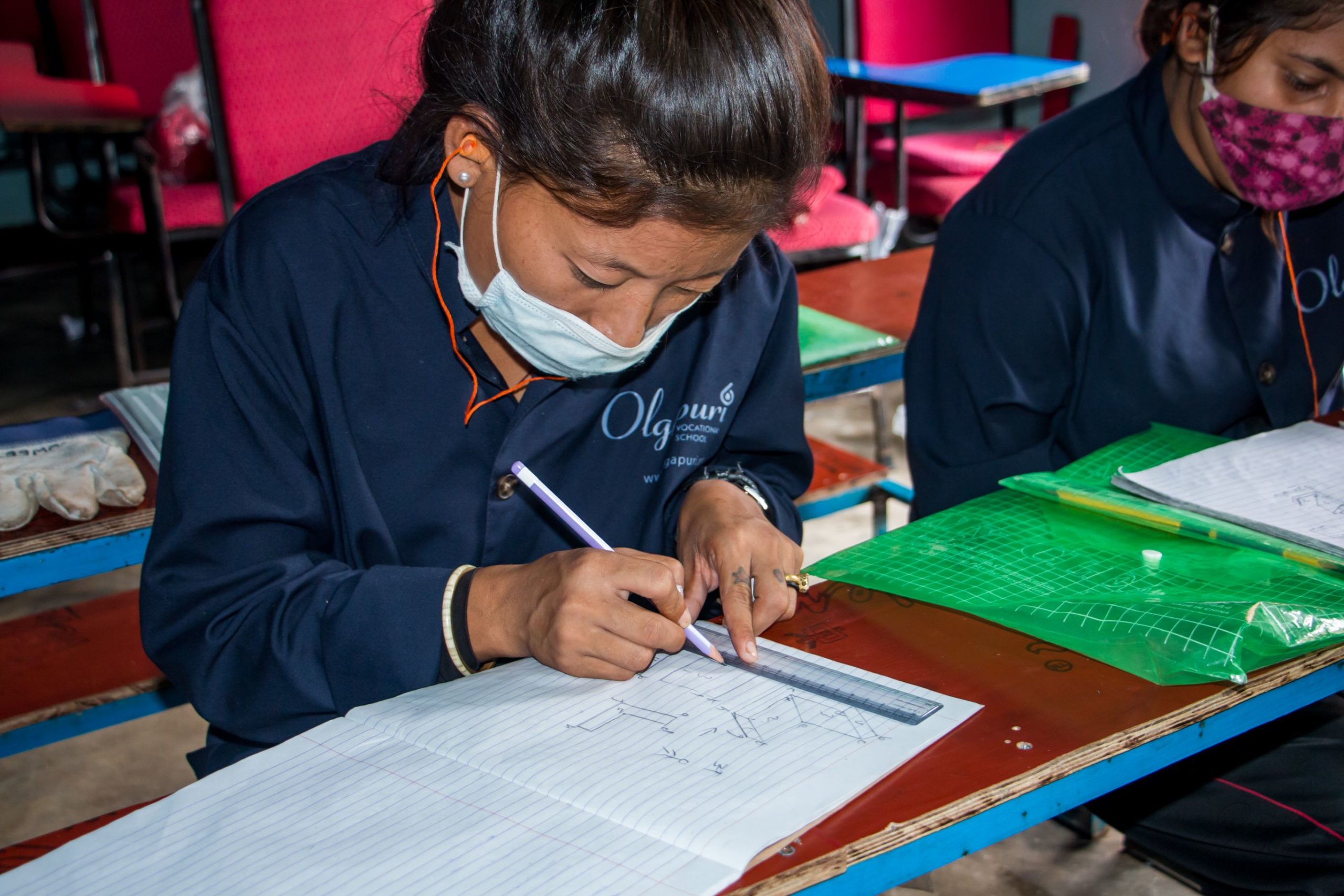
Even for more traditional Nepalese paths, like those in agriculture, valuable modern innovations exist that can raise crop yields and strengthen individual efficiency. But individuals must learn these innovations, and many in Nepal’s rural farming communities have limited access to this information.
In recent years, NYF has been working to expand access to career opportunities for Nepal’s young people.
Our Vocational Education and Career Counseling program provides young men and women with incredible opportunities. Those in our programs receive intensive skills training from expert instructors, entrepreneurship guidance, small business admin and accounting lessons, resume-building and job search support, start-up microgrants, and connections to other young adults on similar paths towards personal economic empowerment.
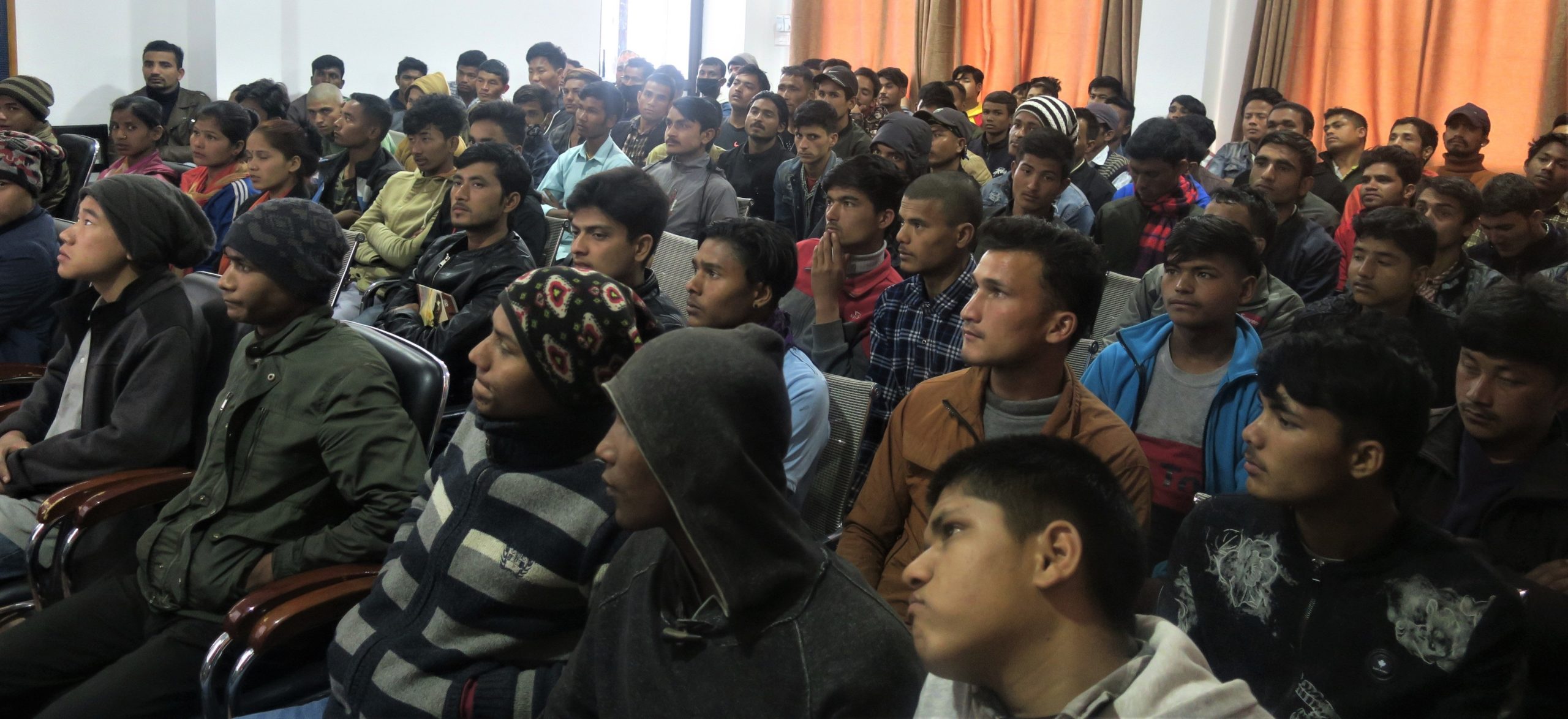
Olgapuri Vocational School
Olgapuri Vocational School (OVS), located on the Olgapuri campus in Kathmandu Valley, brings 20-student classes of men and women together for 3-month certification programs in electrical, plumbing, carpentry, welding, and more. Programs shift to match needs NYF has identified through contacts at major Nepalese companies. We also offer specialized courses in fields like industrial tailoring or special agricultural topics including unique crops (like mushrooms or henna) and innovations (including greenhouse technology).
In normal years, around 90 percent of OVS graduates are employed in their chosen fields within six months.
During most of the pandemic, students have been unable to come to OVS due to travel and safety restrictions. Instead, we have begun taking OVS to rural communities as we launched our Satellite Olgapuri Vocational School program.
Instead of bringing individuals from multiple villages to Olgapuri Vocational School, we sent our trainers—fully equipped with the necessary tools and equipment—out to quarantine in individual villages, conducting the training there before moving to another village.
Soon after launching, municipality offices and schools began reaching out to request these satellite trainings. Requests arrived from all over: including a girl’s school, a children’s home, and an addiction recovery center for young adults.
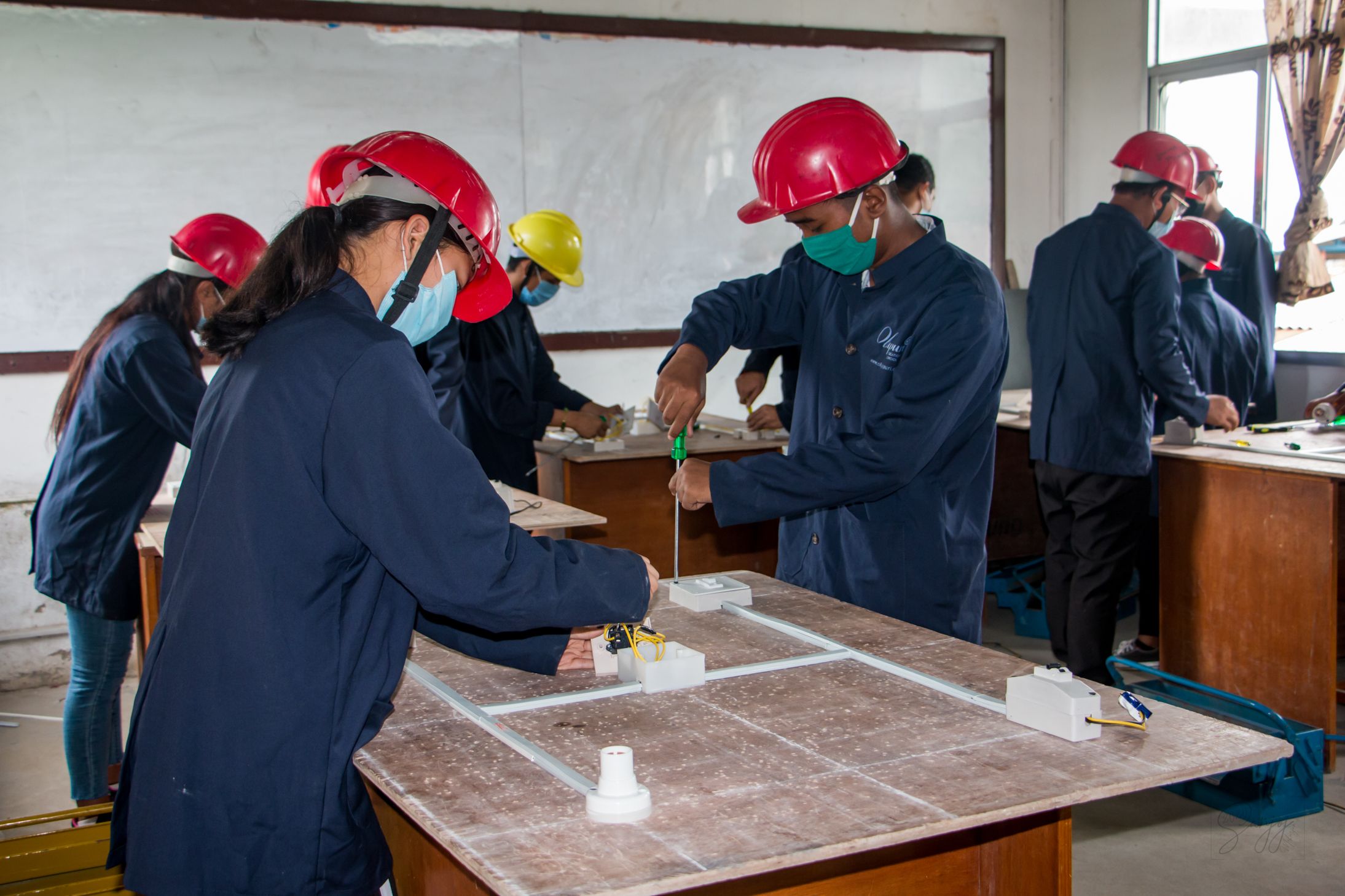
In the final half of 2020, we were able to conduct Satellite Vocational Training courses in nine villages.
A total of 255 students received a full course of training in electrical, plumbing, carpentry, or welding by the end of 2020. Of these, 77 were young women—a higher rate of interest than we usually see. NYF believes this is because the satellite version allowed students to study their new skills without leaving their home villages. This insight is informing the development of new vocational education programming especially for young women.
Empowering Freed Kamlaris
Young Tharu women associated with our Empowering Freed Kamlaris program are still eligible for special skills-based trainings held in their native Terai region of Nepal. Most of these women join our “Tea and Snacks Shop” training program, which teaches the principles of small business ownership and provides start-up funds for each woman to open her own roadside business. Graduates of this program have used their proceeds to buy livestock, to purchase farmland outright, or to educate their younger siblings. Some have even hired their parents or husbands to run secondary locations! In 2020, even through the pandemic, 334 Freed Kamlaris received skills-based training.

Vocational Diplomas
Finally, young people may receive NYF scholarships for earning Vocational Diplomas at long-term technical institutions. Careers may include nursing, engineering, agriculture, the culinary arts, and hotel management. During our 2019-2020 year, 54 students received vocational scholarships, with 9 individuals graduating.
SAAET (Sustainable Agricultural and Entrepreneur Training)
Saaet means “an auspicious moment of starting a new journey”.
As part of NYF’s commitment to helping young Nepalese women build personal economic prosperity and to provide an alternative to child marriage in rural communities, we introduced a new vocational education project in 2021. Called the SAAET Project, or Sustainable Agricultural and Entrepreneurship Training, this satellite-type vocational education program teaches young women how to build and maintain greenhouses, use best organic farming practices within them, and to run a greenhouse-based business.
The program launched on March 22nd with 21 young women (all of them Freed Kamlaris) in the first round. These women learned modern, sustainable methods for producing increased vegetable yields with smaller spaces and reduced labor—and many of them have already built their own greenhouses and planted their first crops. They are looking forward to sharing what they’ve learned with their friends and neighbors!
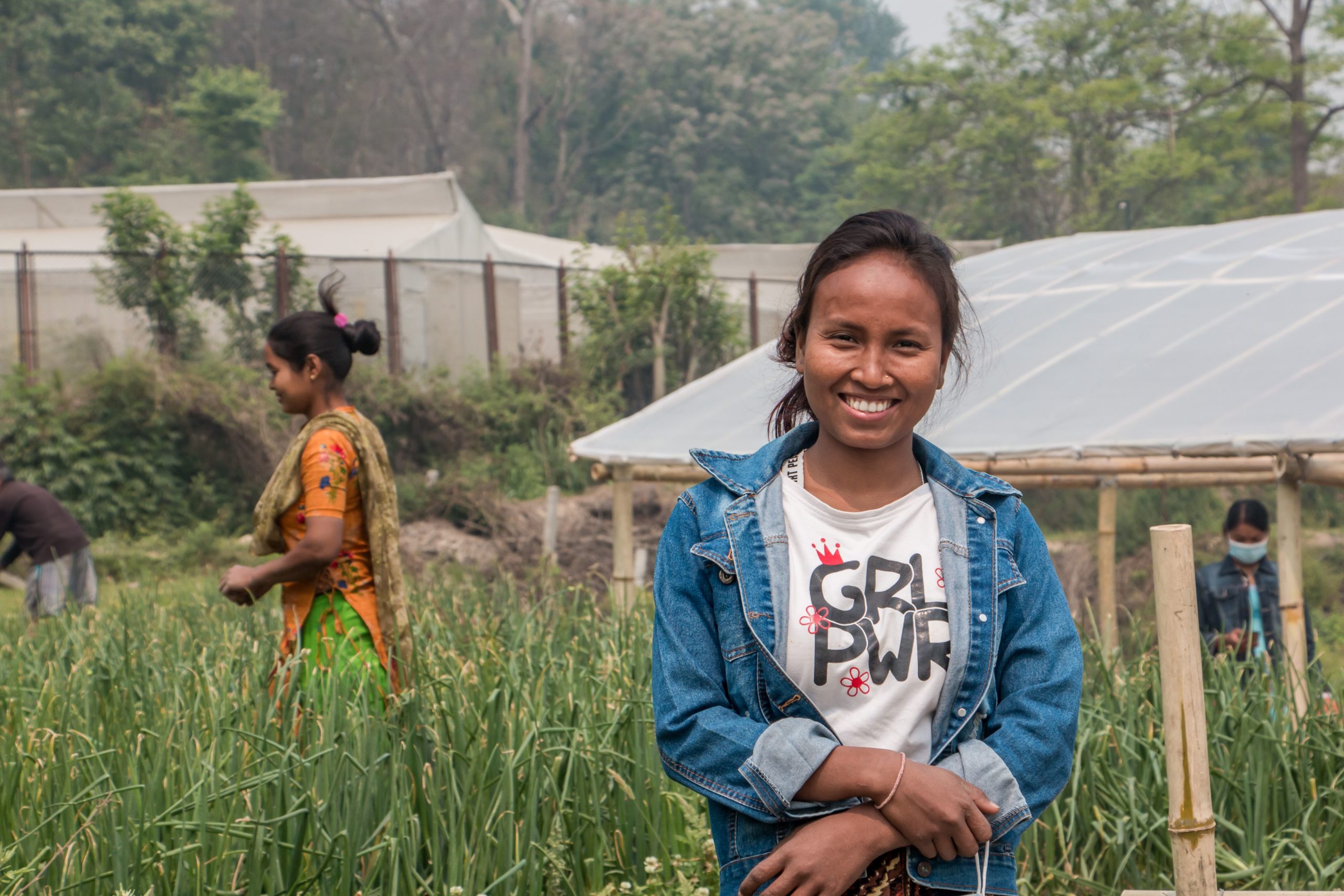
Visit https://nepalyouthfoundation.org/saaet-project-intro/ for more information!
Olga Inspires on CBS Evening News: Still Sharing Her Life’s Mission

Olga inspires just about everyone she meets, so the NYF team was delighted when CBS Evening News with Norah O’Donnell asked to feature her recently.
Viewers who tuned in for the spot’s original airing on the night of July 5th, 2021 learned a bit about Olga’s mission: extending educational opportunities to Nepal’s children, as well as providing health, freedom, and shelter.
We are so grateful to CBS News correspondent Jamie Yuccas for helping Olga inspire new audiences with her story of personal impact in a world that often downplays “women of a certain age”. With support and solidarity from friends around the world, Olga and NYF are helping Nepali children chase their dreams and build brighter futures for themselves, their families, and their communities.
“I don’t think about stopping,” Olga says. And neither does the global NYF team. Thank you all for being part of this incredible continuing journey!
You can watch the full segment on YouTube or Facebook. CBS Evening News also tweeted about this special segment, which can be viewed here.
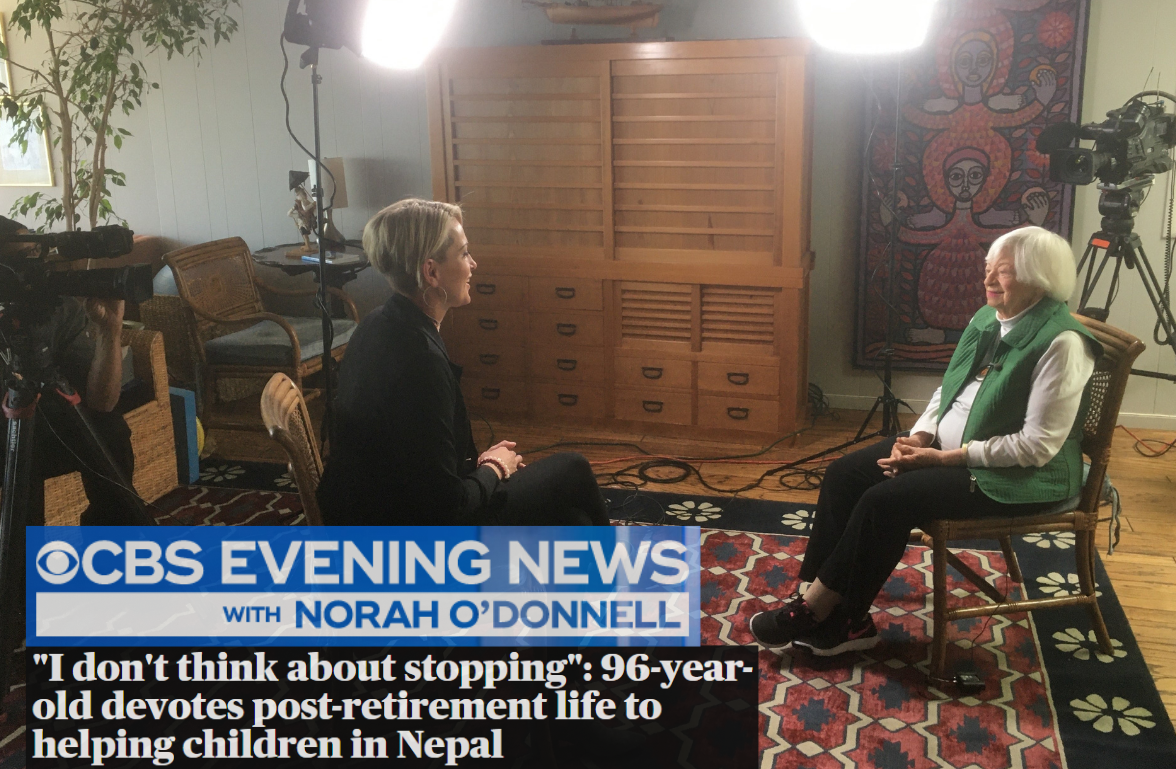
Frontline Warrior: NYF’s Lila Tharu Celebrates Freedom Day by Saving Lives
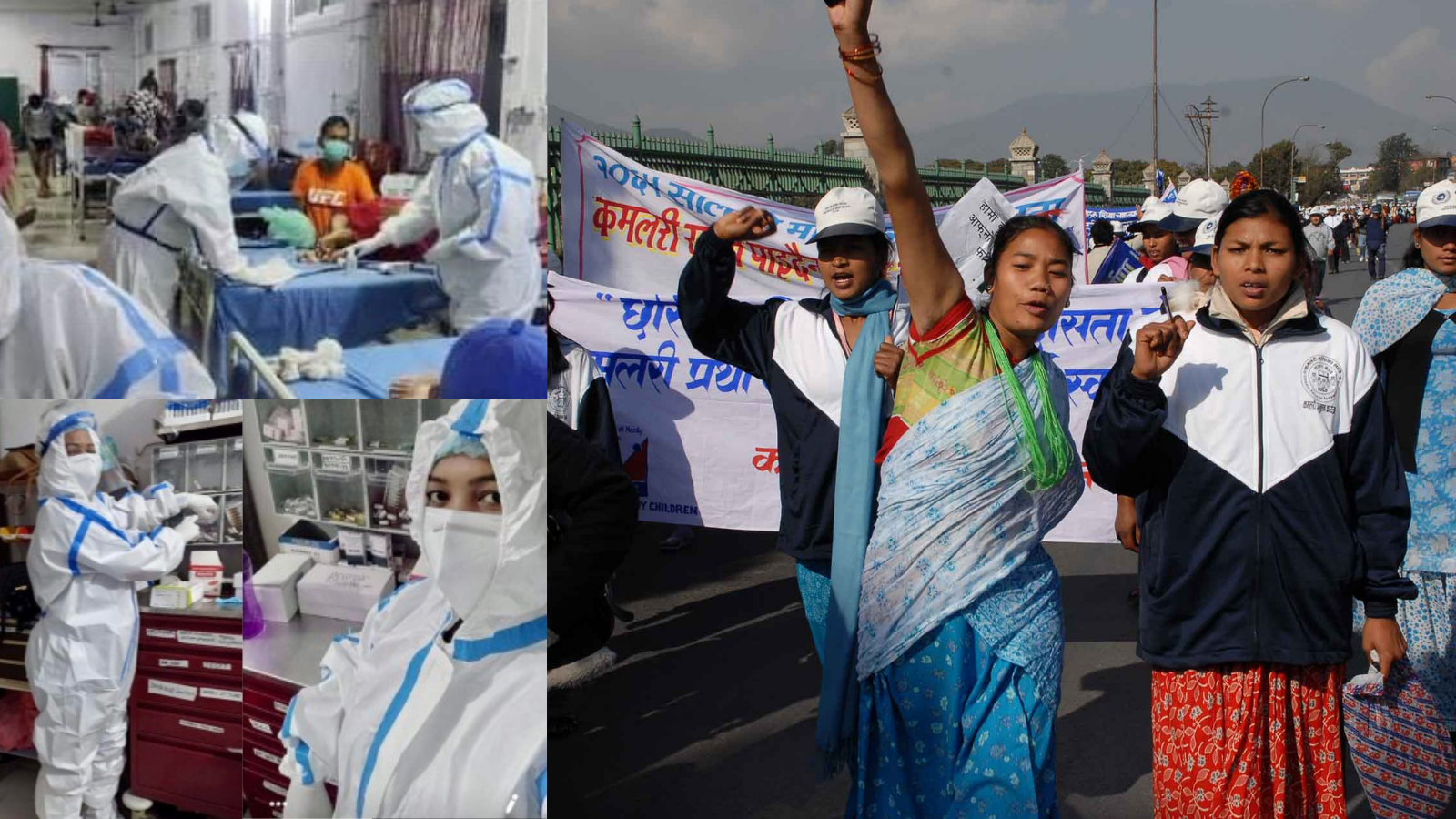
Frontline warrior healthcare workers across the world have spent nearly 18 months battling COVID-19 to defend their communities. These heroes have saved countless lives during the pandemic.
For one of these warriors, Lila Tharu, age 26 (below), her status as a nurse and midwife is a source of particular satisfaction. NYF is proud to count Lila among our many accomplished alumni now to heal their communities during this crisis.
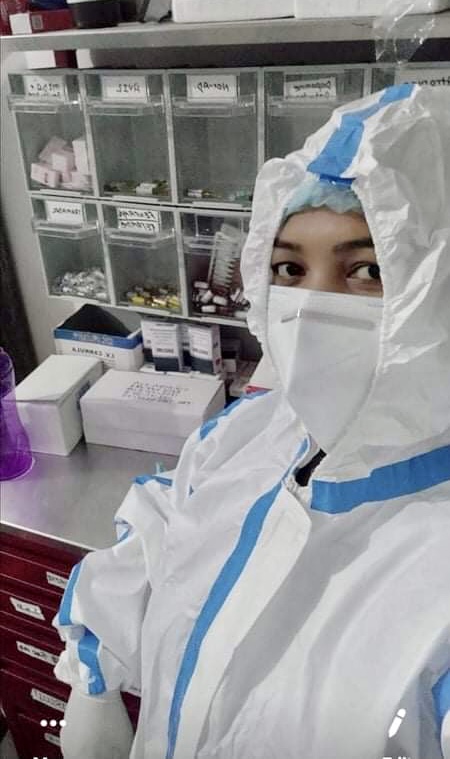
Kamlari Freedom Day
June 27th, 2021 marks the 8th anniversary of the legal abolition of the kamlari practice in Nepal—otherwise known as Kamlari Freedom Day.
Kamlari was a form of indentured servitude which exploited the daughters of the Tharu ethnic minority group in Western Nepal’s Terai region. After generations of predatory lending by more powerful “land-owning” groups, the practice emerged as the only way for families to pay back exorbitant generational debts.
At every Tharu New Year, parents sold their daughters—some as young as six years old—to work long hours in the homes of strangers. In return, families would receive an average of only $30 for an entire year of their child’s labor. Thousands of Tharu girls spent their entire childhoods in kitchen slavery. Some never returned home.
To people in the Western Terai, the kamlari practice had come to seem inevitable. It was a baked-in cultural truth that very few people dared to question.
Lila Tharu – Kamlari Life, Rescue & Education
Lila was born in Thakurbaba Municipality in Bardiya District. When she was 12, Lila was sent away to work as a kamlari in 2005. Her two older sisters had also worked as kamlaris.
After two years working in her master’s house and being denied an education, Lila was identified and rescued by Nepal Youth Foundation in 2007. Through the Indentured Daughters program, her family was provided with economic support to offset Lila’s lost “wage.” It also included the materials needed to allow Lila to return to school: a kerosene lamp to study by, a school uniform, notebooks, and more.
Lila was a determined student who dreamed of becoming a midwife. Soon after her rescue, she enrolled in grade 7 at a local school. She completed high school (10th grade at the time in Nepal) in 2012, passing her country’s notorious SLC “Iron Gate” exam. Lila earned a place in the Auxiliary Nurse Midwife program at Sushma Koirala Memorial Institute in Nepalgunj. NYF provided her with a college scholarship throughout her studies.
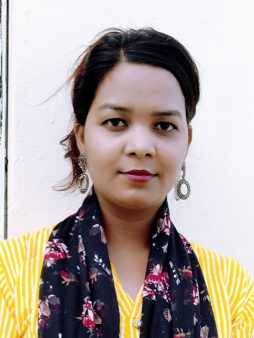
NYF continued to provide career support as Lila began her nursing career in a private hospital in Banke District. And in November 2016, she finally landed her dream job as an Auxiliary Nurse Midwife at Bheri Hospital in Nepalgunj, the largest government hospital in the region. She has remained there ever since, continuing her education by taking Nursing Care and Skilled Birth Attendant trainings to further enhance her skills.
The salary she brings home each month is far beyond what members of the Tharu community thought possible for one of their daughters only 10 to 20 years ago. Not only is Lila serving a critical role in her community’s health system—she is proving the incredible potential within a Tharu girl.
Lila Tharu – Frontline Warrior
At the beginning of 2020, Lila was living at home with her mother while continuing her career. Lila’s father had passed away years before, and her two sisters were now married.
Things changed in Lila’s work life when the pandemic hit. She was added to a special COVID treatment team early on and assigned temporarily to nearby Sushil Koirala Cancer Hospital in Khajura. This hospital had been set aside especially for COVID patients. Lila worked there for several weeks during the pandemic’s first wave. She also served COVID patients in mandated isolation in a Kalpatri hotel during this time.
Now, during Nepal’s intense second COVID wave, Lila’s hospital in Nepalgunj is at the epicenter of the crisis. Many young people from Western Nepal cross the border into India to find work. When the virus surged in India earlier this year, they fled back north to escape the pandemic—not realizing they were bringing the virus home with them.
Bheri Hospital now has four dedicated COVID wards. Lila (below, in white at far right), who has valuable COVID Care experience from 2020, is a frontline warrior in one of them.
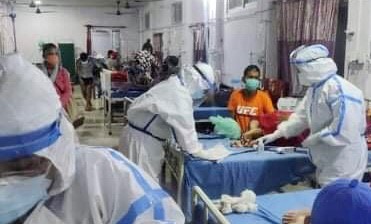
She is hard at work monitoring her patients’ vital signs, measuring oxygen levels, and providing intravenous therapy and medicine, as well as other critical care. COVID death rates for hospitalized patients are frighteningly high everywhere, and Lila’s ward is no different. During this second surge, they have lost an average of 3-4 patients per day. But Lila tries to remember the lives she has helped to save as well. Many of her surviving patients would not be able to return home if not for her.
In spite of rigorous safety protocols, Lila herself caught COVID in the spring, like many other frontline warriors across the world. Fortunately, her symptoms were mild. After a short isolation, she returned courageously to the COVID ward to continue her lifesaving work.
She will continue this work until her expertise is no longer required in the COVID ward. She (below, preparing medicines for a patient) is proud to be doing this important work in her community—and grateful to the NYF Community for making her journey possible.
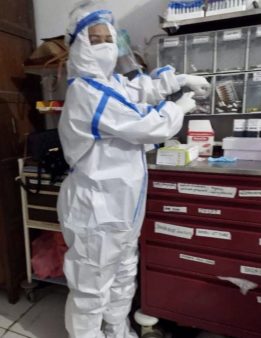
Just One Story of Thousands
Lila says she was afraid when the virus first arrived in Nepal. But now, she is extremely dedicated to the community she serves. Her courage is nothing new to NYF.
Like the other Freed Kamlari women, Lila had already experienced intense hardship and taken many daring steps before COVID arrived. Together, while most of them were still children, these girls dared to challenge their communities, abandon their masters, question their culture, and declare their own worth. Many of them returned home to families who resented them for taking such bold steps. Others were injured while marching for kamlari freedom, as police objected to the girls’ protests against the government.
Lila is one of thousands of Freed Kamlari who refused to stop simply at being rescued from an exploitative practice.
She and so many others have claimed their personal power by seizing educational opportunities and chasing their dreams – and working to lift their sisters and daughters in the process. Some are becoming lawyers, determined to defend human rights. Others have become small business owners or specialized farmers, gradually building personal and generational wealth in ways their parents could not.
And some, like Lila Tharu, dreamed of helping others in the healthcare field. They’ve grown up to be frontline warriors in a global crisis they never imagined.
Happy Kamlari Freedom Day, Lila!
Happy Freedom Day to ALL of the Freed Kamlaris
and to the young girls and women who will never be bonded away!
And Happy Freedom Day to the NYF Community—to everyone who helped support this incredible program. Lila’s story, and so many others like it, are proof of the amazing way your #LoveWorks.
Celebrate with NYF today.
To help celebrate this joyous occasion and support the education of brave young women like Lila, please make a thoughtful gift for NYF Scholarships or our Vocational Education program on our donation page. Additionally, join the NYF Community by signing up to receive emails here.
Purposeful Living & Olga Murray: A Celebration and an Invitation
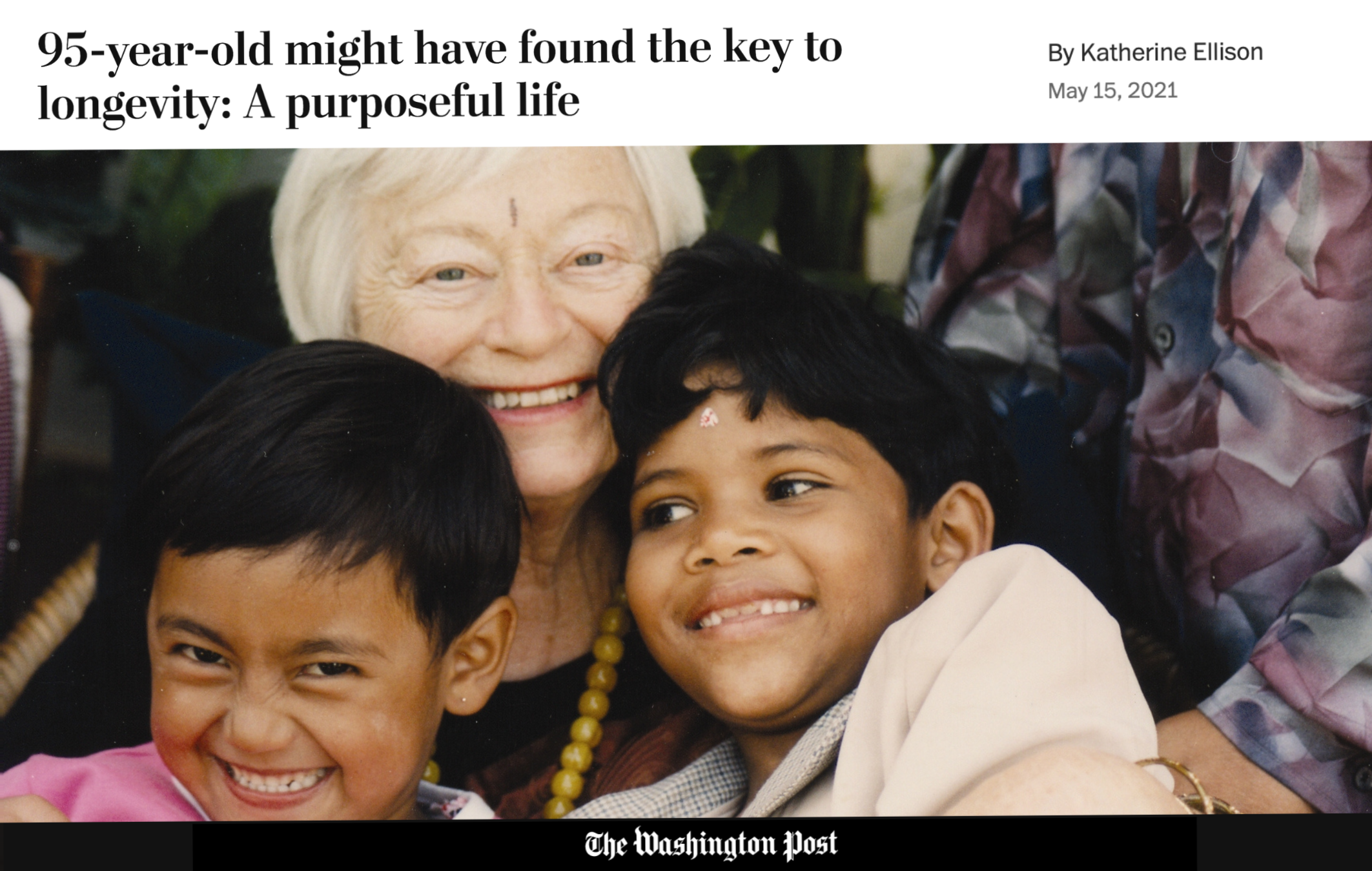
Purposeful living is the focus of a new Washington Post article about our very own founder, Olga Murray (click the link to open the article in a new tab – it is a beautiful tribute by Pulitzer-Prize winner Katherine Ellison!). Our beloved Olga, on the cusp of her 96th birthday, has been an inspiration during the past year of lockdowns and uncertainty.
‘ “I’m not a doctor,” ‘ the article quotes Olga during a recent interview, ‘ “but I do know that when I get out of bed every morning and think that I might help a little kid in Nepal, I’m not focused on my body… My main focus is on the kids.”
In her interview, Olga is characteristically modest. So much of Olga’s work is driven by her belief in others. She believes in those she partners with at NYF, like President Som Paneru. She believes in her friends, her connections – all those generous donors who make her work possible. Most of all, she believes in the children of Nepal, and in the incredible things they can accomplish if given the proper opportunities. (Bishnu Chaudhary, the young woman freed from domestic slavery who recently passed the Nepalese bar exam, is just one example!)
Even with purposeful living fueling her longevity, “I’m not going to be around forever,” Olga says pragmatically. “And the thing I want most in the world is for this program to go on.”
The NYF community is determined to make that wish come true.
If you’d like to learn more (and to see Olga Murray live over Zoom!), click here to register for our upcoming virtual Founder’s Day celebration! Join NYF’s email list here.
To support NYF’s mission during this challenging time – bringing Education, Health, Shelter, and Freedom to Nepali children – please donate here. For more powerful impact, consider making yours a monthly donation!